December 25, 2021.

Christmas is joyful
because Christ is our joy
An angel appeared to the shepherds of Bethlehem announcing, "I bring you news of great joy. For you is born a savior who is Christ the Lord. Here is the sign: you will find a babe wrapped in swaddling clothes and lying in a manger." For shepherds, it was a heavenly joy to be surrounded by a multitude heavenly hosts singing, "Glory to God in the highest, and to men peace on earth." A savior who brings peace was their greatest expectation. It is this joy that allows Christians through the ages to give glory to God in the highest.
For the shepherds living in the midst of their flock, a babe in a manger was nothing special. It was a sign that the savior was friendly to them, one from among them. It was a sign that the savior would be a friend of the downtrodden, the powerless, the weak, and sinners. No king was ever born in a manger and probably never will. Yet such powerless savior was at ounce seen as a threat to King Herod who ordered all children of his age to be exterminated. Even a heavenly savior from heaven seems to have no future in our world. Then, how can he save us?
Our joy at Christmas also comes from the angelic announcement, "He will be called the Son of the Most High. He will reign over the house of Jacob forever. His kingdom will have no end." It is our joy to be able to say that the baby of Bethlehem is the Son of the Most High. He is our faith for the present and our hope for the future. His kingdom has come but is still in the making. It is our happiness to contribute to it, even in minute ways.
Today it is most appropriate to sing "Gloria in excelsis Deo" with the people in St. Peter' s basilca in Rome.
TO AVOID ADS, MUTE YOUR COMPUTER as soon as an ad begins. Click on the screen a few times, then click on "SKIP AD." |
December 19. Forth Sunday of Advent

My soul praises the greatness of the Lord!
How difficult it is to praise others for their greatness! But at Christmas we must give praise to God. “The Almighty has done great things for me.” There are many people blessed with more talents, more income, more luck in life than me. It is tempting to compare oneself with those above, but not those below. Millions survive on only a few dollars a day, many children die before the age of 5, many will not receive a secondary or higher education. Many people throughout the world are born in disadvantaged families or poor neighborhoods. We must give thanks for what we have received.
“The Lord has shown mercy from generation to generation to those who honor and fear him.” It is when we live in honor and fear of the Lord that we can see his mercy. His generosity is most apparent in the long run, from generation to generation. Mercy is a form of benevolent love. His mercy is shown when he looks with favor at our humble condition, we his servants. No one can make arrogant demands to God: we are all servants of humble condition.
“He has toppled the mighty from their thrones and exalted the lowly.” Not all the mighty are toppled down, but the most arrogant easily create their own downfall. Emperor Nero saw no limits to his power. He murdered his mother and his wife, poisoned his stepbrother, and wanted Christians to be exterminated. Not to be killed, he killed himself at the age of 30. History is full of tyrants toppled by rebellions and millionaires ending in poverty.
“He has kept the promise he made to our ancestors to help his servant Israel,” and this is what we celebrate at Christmas. Every year at Christmas we give thanks. Every Christmas we can say with Mary, "My soul praises the greatness of the Lord!"
There are many versions of the Magnificat. Here is one with the lyrics
December 12. Third Sunday of Advent

God's new creation:
Mary, Joseph, Peter, Paul & us
The angel Gabriel came to Mary to announce a new creation: the Son of the Most High will rule forever, and there will be no end to his kingdom. All people are invited to be part of it. The first (and reluctant) invited was Joseph. He was a just man and wanted to dismiss Mary. But an angel of the Lord appeared to him in a dream: he would be the foster father of the new kingdom. Within a short time, Mary rushed to visit Elizabeth whose infant leaped in her womb, out the joy of welcoming the mother and child of the new kingdom. In Bethlehem there was no room for Mary and Joseph in a public inn, but the angels appeared to shepherds to be the first witnesses of the new king. More were invited. Within weeks magi came from afar offering gold, frankincense, and myrrh, gifts most appropriate for a king. This is the new creation: family relatives, shepherds, and magi have become friends of the divine messiah.
Thirty years later, the story continued when Jesus selected the twelve to be his closest friends. He invited fishermen like Peter and Andrew; a tax collector, Levi; a political zealot, Simon; a doubter,Thomas, and Judas Iscariot. Later he appeared to Saul the persecutor of the church. And through the ages, he called thousands and thousands, millions and millions — you and me — to be friends of God and friends of people, to love God and neighbors.
At Christmas we celebrate this new creation. When we stand in front of the crib, we are in company not only of Mary and Joseph, the shepherds and the Magi, but also the angels, the twelve apostles, and all the friends of God throughout the ages. All the saints and followers of Christ will be there to praise and sing, "Glory to God in the Highest." This is what the angel had announced to Mary: the Son of the Most High will dwell among us, and of his kingdom there will be no end.
There are many beautiful Advent songs. In the following collection, select the one you like. There is the favorite, " O Come, O Come, Emmanuel." See also, " Maranatha."
December 5. Second Sunday of Advent
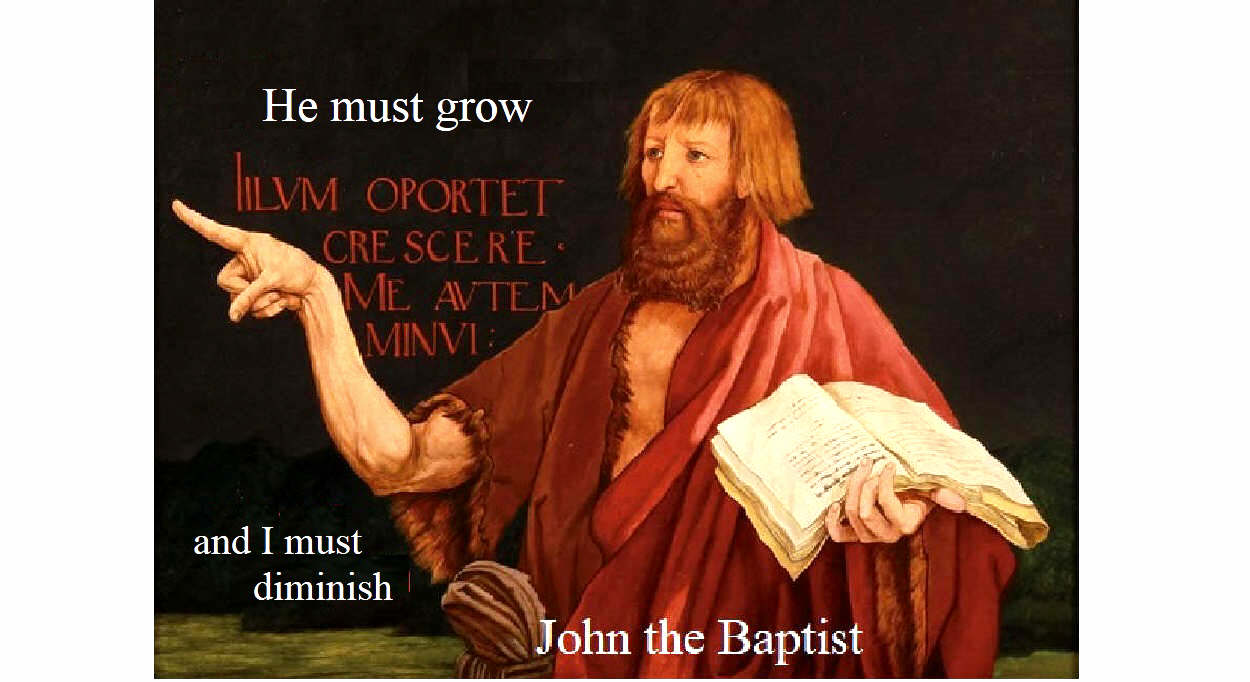
Christ must grow in us
& our ego diminish
John is crying in the desert, "Prepare the way for the Messiah. Let his road be easy, with no mountains to overcome, and no deep valley to go through." Centuries before, Isiah had announced the same message for the return of the Jews from exile in Babylon. Then “all flesh shall see the salvation of God.” It will be like a new creation.
The message is “Prepare!” As we prepare by shopping for gifts and Christmas decorations, we must also prepare for Christ's symbolic coming at Christmas. We should have some special gift for the Lord so that he will shower us with his blessings. Christmas is the time for exchanging gifts. We can make a donation to the needy, send a postcard to people who are alone or lonely; we should also have some special gift for the Lord.
Holocaust and victims you do not want, so I said, "Here I am Lord. I give you everything I am, everything I have and possess. Give me only your grace. Call me to be among your followers." This is my prayer and desire. May working for your kingdom also become part of my life. The ways of the Lord are unknowable: we do not know what will happen tomorrow. So I pray, "Arrange all things, Lord, so that my whole life be at your service."
There are many Advent hymns and carols. Here is "Behold! The Baptist's Warning Sounds":
Behold! the Baptist's warning sounds
thrill through the Jordan's winding bounds:
as rings his herald voice on high,
let listless slumber quickly fly!
Then cleanse your hearts, to sin a prey;
for God approaching smooth the way;
prepare for him a place of rest,
meet home for such a worthy Guest.
November 28 - First Sunday of Advent
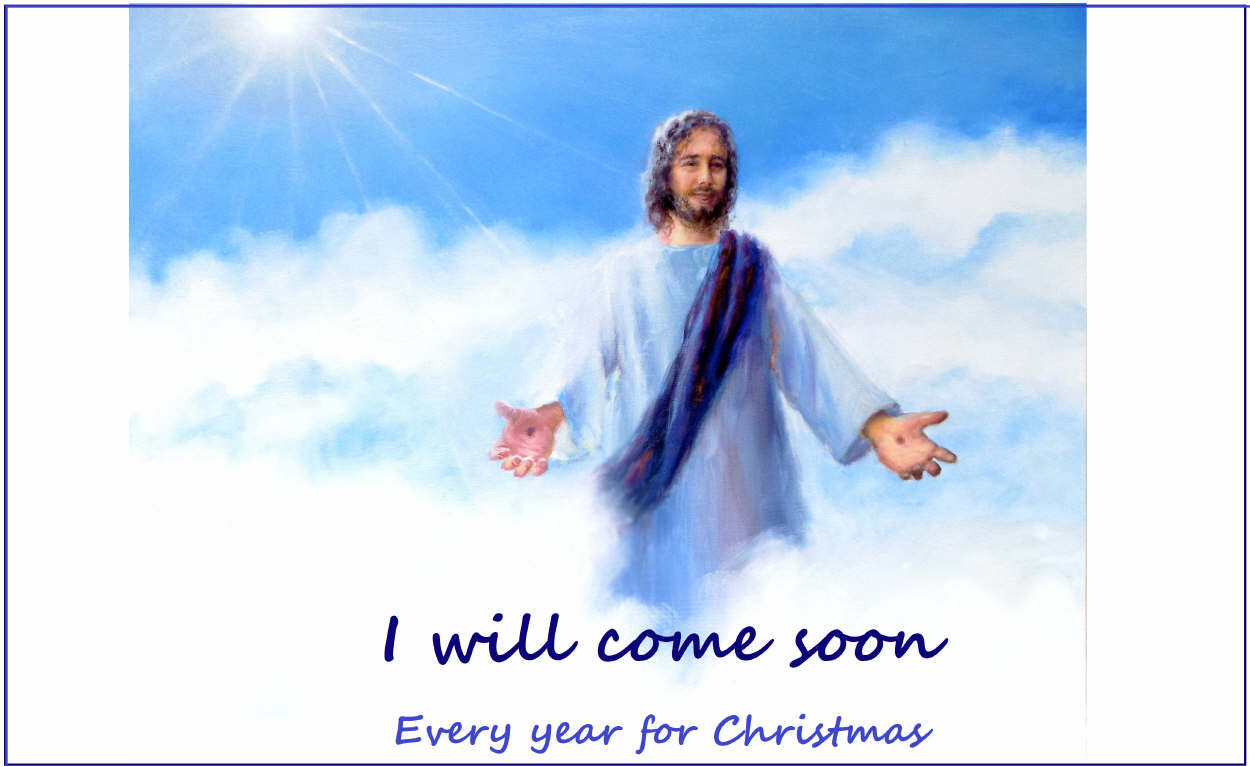
"Come, Lord Jesus, Come!"
"I saw a new Jerusalem coming down from the God of heaven." The Lord will dwell among us. He will be our shepherd and we will be his people. His coming will reconcile heaven and earth, and this kingdom will have no end. There will be no temple in this eternal city, because its temple is God almighty and the Lamb. The city will have no sun and no moon, because the light of the Lord will shine forever. But this will happen at the end of time.
Every Christmas we celebrate symbolically the reconciliation between heaven in the birth of Jesus. Each year this reconciliation comes after an advent of preparation. During this time we can only cry, "Come, Lord Jesus, Come." Our souls are in a permanent state of expectation and waiting. This is the time of hope inspired by faith, the hope experienced by the prophets and the pious Jews who expected a Messiah to come.
Waiting for the messiah, waiting from Christ to come makes us no different. We still have to cater to the every day chores, go to work, earn an income, and live frugally. But during all this time we must live in justice and holiness, like Elizabeth and Zechariah. This ordinary time will not be ordinary: we will live in hope and faith, and our hearts filled with the psalms and the words of scripture.
A common song during advent is O Come, O Come, Emmanuel Skip ads and sing along.
November 21
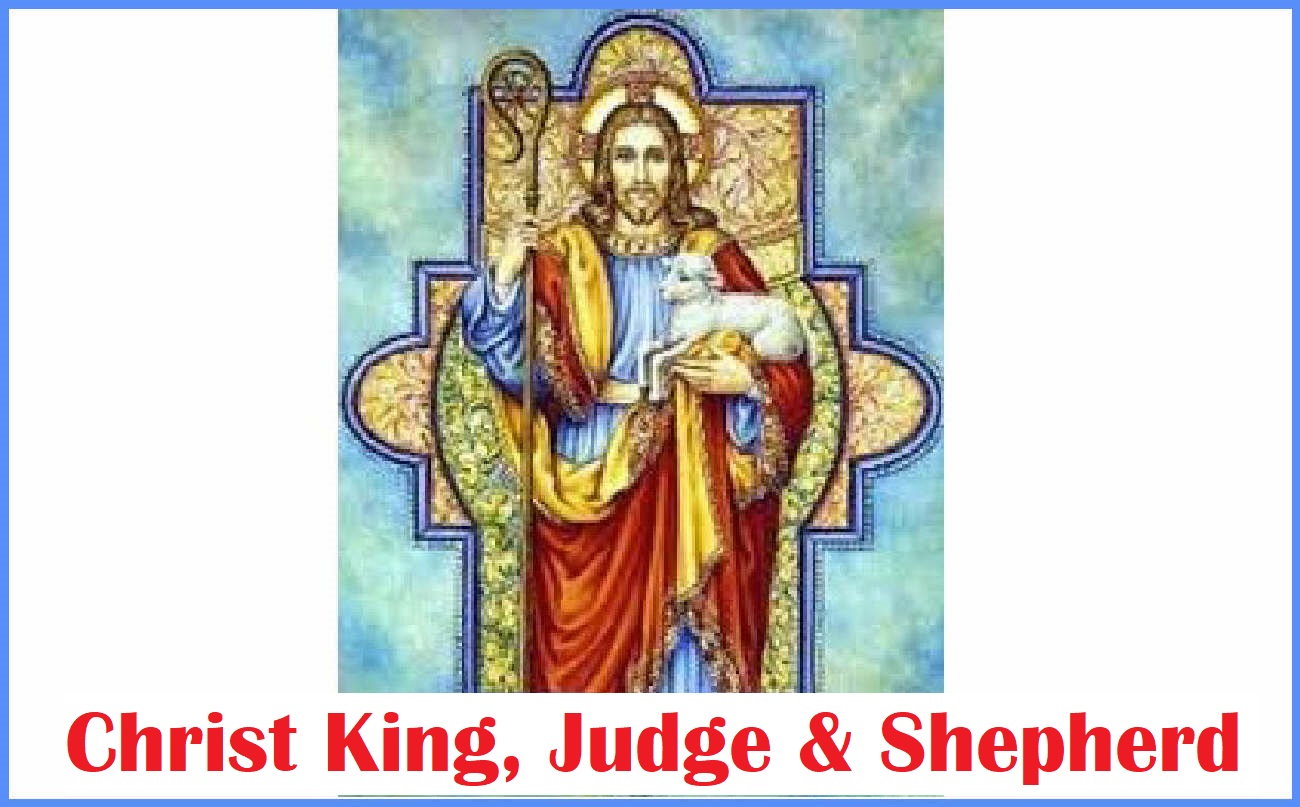
Today we celebrate Christ as King and Judge of all nations, and also as Shepherd who knows and guides his sheep. At the Last Judgement, Christ will show both justice and mercy.
For centuries people have been afraid of the Last Judgement. Maybe preaching then only emphasized God’s justice. Or maybe they lacked faith in God’s mercy. It is not enough just to say one is saved by grace alone: faith is an everyday demand. Faith requires trust in God in all circumstances, but we often prefer to have faith in ourselves. Most often, when we are in trouble, we think about a “plan B” to get out of it. No. We should trust God first, and then think of a “plan B.” Faith should be greater than our own problem-solving plans. God’s vision of the future is greater than what we can imagine.
“You people of little faith, why are you so afraid?” said Jesus in the midst of the storm at sea. “Do not be afraid of those who kill the body but cannot kill the soul.” If we should not be afraid of death, what is there to be afraid of? “Take courage! It is I. Don’t be afraid” said Jesus when appearing to the barricaded disciples in their locked-up room. “Take courage” means: control yourself! Don’t be irrational and childish! When they heard “It is I” the disciples overcame their fears. In the gospels Jesus says “Don’t be afraid” about 20 times. Will we get the message?
“I am the good shepherd. I know my sheep and my sheep know me.” Jesus was the friend of sinners and tax collectors. He is also our friend. “I have called you friends, for everything that I learned from my Father I have made known to you.” If Jesus calls us friends, we should also treat him as our friend. We can measure our friendship with people by how often we visit them, like once a week, or once a month, or once a year How often do we visit Jesus as our friend?
If we have faith, we become faithful servants. On Judgement Day Jesus will say, ‘Well done, good and faithful servant! Come and share your master’s happiness!’ This is what we would like to hear, and this is what we will hear if we have faith.
ADVENT BEGINS November 28. We have four weeks to prepare for Christmas.
November 14
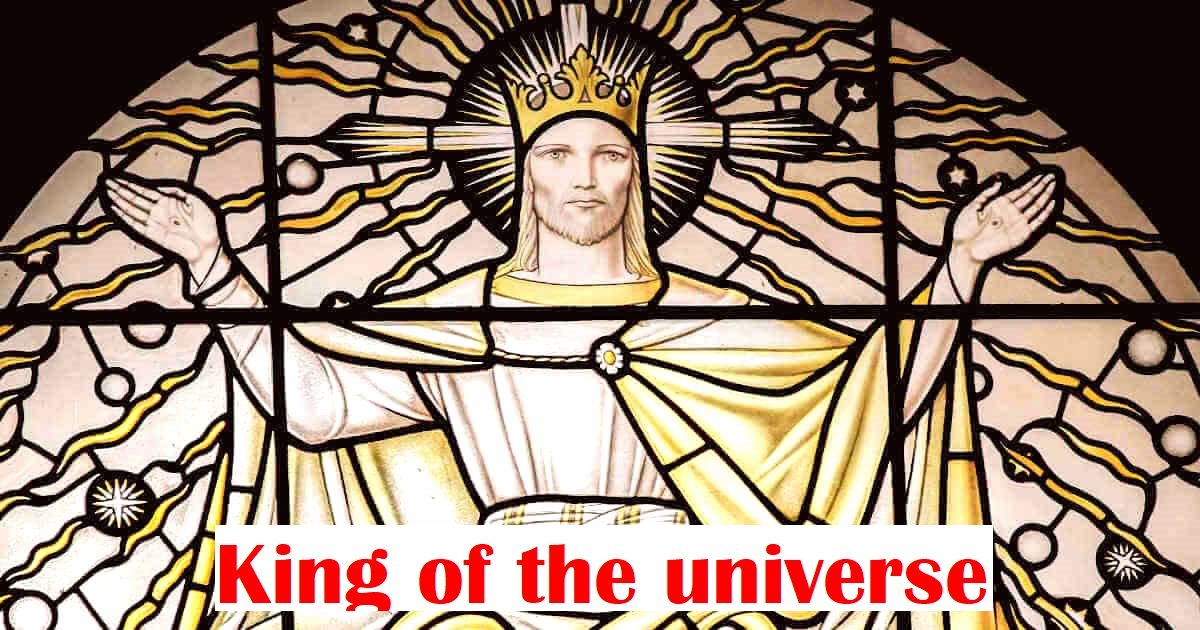
Christ infinite and eternal, king of the universe
Before the creation of the world, before the beginning of time and space, there was infinity and eternity. When the whole universe will cease to exist, there will again be infinity and eternity. The notions of infinity and eternity refer to God, but In the Christian tradition, they refer to the Father as creator, the Son as redeemer, and the Holy Spirit as our Sanctifier.
"In the beginning, God created heaven and earth ." These are the first words of the bible. At the appointed time, God sent his son who became flesh, and he made his dwelling among us. He is both son of man and son of God. "He was in the beginning with God, and all things came to be through him. Without him, nothing came to be." These are the first words of the gospel of John. Christ is infinite and eternal, the equal of the Father, cocreator, and king of the universe. We adore you.
St. Paul in the letter to the Colossians is equally clear. "In him all things were created, things in heaven and on earth. He is before all things, and in him all things hold together. He is the beginning and the firstborn from among the dead. Through him all things are reconciled, on earth and in heaven."
Christ is the alpha and the omega, the beginning and end of all things, but also everything in-between. Creation, salvation, and sanctification are continuous throughout history, and also in every individual's life. He is the "Christ in us" who conforms us to his image, as we are made in his image and semblance. In him and through him all things are reconciled; he is the new creation without suffering and death. He is the firstborn in this new creation who will lead us into his eternal kingdom. He is the infinite and eternal King of the universe.
Many psalms sing the primacy of God over the universe, especially psalm 93: "The Lord is king. He is robed in majesty." Sing along. (Skip ads)
October 31-November 7
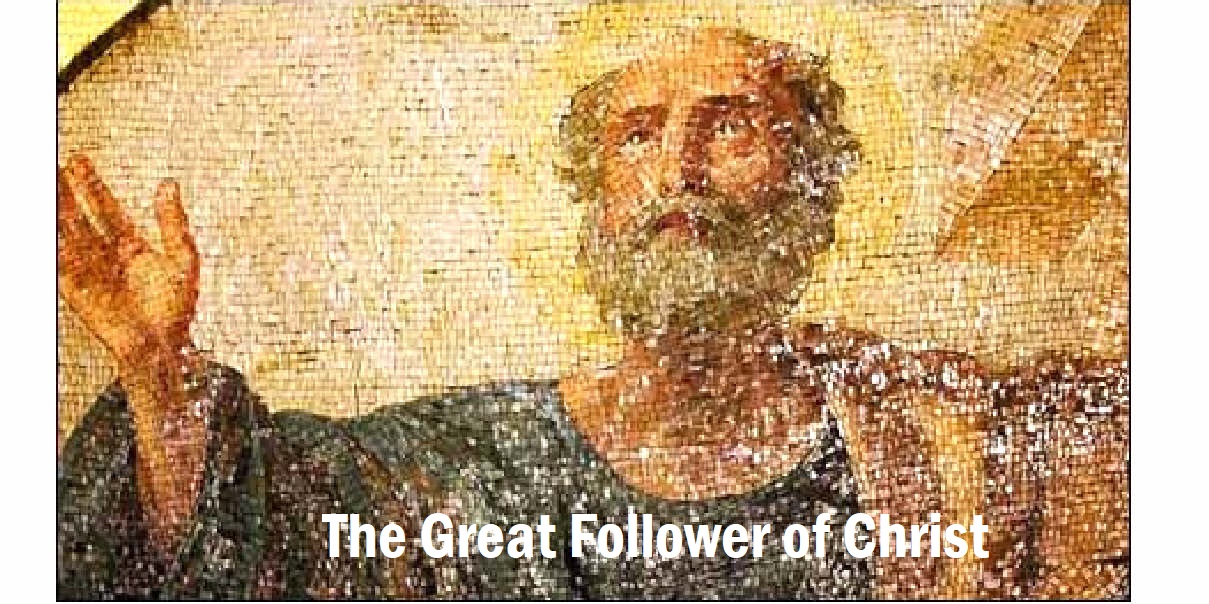
St. Paul, Model Follower of Christ
On the road to Damascus, Saul was blinded by the light he persecuted. “Saul, Saul, why are you persecuting me?” Why? Yes, Why? In response, Saul did not eat and drink for three days. After baptism he recovered his sight. He also saw life in a new light, the light of Christ.
Paul changed from a persecutor of Christ to a follower, but his personality was not changed. If before conversion he was domineering, impatient, and prone to anger, he was still the same. It is the same for all of us: to accept Christ does not change our personality. Following Christ means more than accepting him as Lord and Savior; it means progressively becoming Christ-like.
To follow Christ means making him the center of our lives. It was so for Paul.
- “For to me, to live is Christ and to die is gain.”
- “Nothing separate us from the love of God which is in Christ Jesus our Lord.”
- “I no longer live, but Christ lives in me. I live by faith in the Son of God, who loved me and gave himself for me.”
- “I count all things but loss for the excellency of the knowledge of Christ Jesus my Lord.”
Striving to imitate Christ was Paul's goal. “I have not yet arrived at my goal, but I press on to take hold of that for which Christ Jesus took hold of me. Forgetting what is behind and straining toward what is ahead, I press on toward the goal to win the prize for which God has called me heavenward in Christ Jesus.”
Following Christ is not easy. It was not easy for Paul. “In my inner being I delight in God’s law; but I see another law at work in me, waging war against the law of my mind and making me a prisoner of the law of sin at work within me.” Like all of us he suffered from human weakness: “What I want to do, I do not do, but what I hate I do.” What we cannot do on our own, we can do by the power of God: “I can everything in the one who strengthens me.”
St. Paul was an ideal model for us to follow Christ. St. Paul, pray for us!
October 24 Acts 21-26

Paul wasted years in prison
A few days after arriving in Jerusalem, Paul was apprehended by a mob, taken into custody by the Romans, and sent to Rome in chains. He had plans to go to Spain and visit the Christian community of Rome on his way. All of this came to naught. He spent some of his most precious years in confinement. Was this wasted time?
Many people experience time of forced idleness, because of ill health or unemployment. The pandemic has forced the whole world into idleness. Was it a waste of time? Only if we do not take advantage of it. Many people increased their contacts with family members. Relationships often reach a deeper level when speaking at a distance rather than face to face. Idleness is also a time to catch up with postponed chores and readings.
“All things work for good to those who love God” (Romans 8:28). What good can come out of days or months of sickness? Or out of a broken career or marriage? Nothing! So it seems. But the meaning of a trip often only comes at the end of the journey. In fact, many failures have no special meaning, except to learn to do better the second or third time.
Those who sow with tears
will reap with songs of joy.
Those who go out weeping,
carrying seed to sow,
will return with songs of joy,
carrying their sheaves . Psalm 126
Forced idleness tests our faith and hope. At the beginning of a long tunnel, all is dark. It takes faith and hope to continue. Only at the end will there be light. You have to believe what is says in psalm 23: “The Lord is my Shepherd.” (Psalm 23 – listen and sing!) With this belief, the dark tunnel will have sparks of hope.
October 10-17. Book of Acts: 17

Paul in Athens: Nature is the image of the invisible God
“Athenians, you are a very religious people.” In all people there is some good. When arriving in Athens, Paul had become exasperated at the sight of the many idols,” yet even idolaters can be seen as religious.
“As I walked around, I discovered an altar inscribed, “To an unknown God. What you unknowingly worship, I proclaim to you.” Paul relied on the common belief that God made the world and all that it contains, not a God made by human hands. This is something his educated listeners could agree on.
“He fixed the seasons so that people may seek and find him.” Nature and the universe are images, icons, and traces of the invisible God, so that we may find him. “Indeed, he is not far from anyone of us, for in him we live and move and have our being.” This is a quotation from the Greek literature, known to the Athenians.
What is our common ground? God is invisibly but present in nature. He dwells in all people. He speaks through conscience and circumstances. We must listen to his inner voice.
Psalm 8 says it better than anyone else. Listen and sing along:
Lord, our Lord,
how majestic is your name in all the earth!
When I consider your heavens,
the work of your fingers,
the moon and the stars,
which you have set in place,
what is mankind that you are mindful of them,
human beings that you care for them?
You have made them a little lower than the angels
and crowned them with glory and honor.
Lord, our Lord,
how majestic is your name in all the earth!
September 26-October 3. Book of Acts: 16

Road blocked for St. Paul and usPaul’s plan was blocked and then he had a dream. This is how he found the will of God. Something similar often happens to us, in a variety of ways.
In his second mission trip Paul run into trouble. From Derbe in the middle today’s Turkey, Paul wanted to go east toward Ephesus, but he was prevented from doing so. He went north and wanted to continue towards the Black Sea but was blocked again. So, he went north-east to the port of Troas in the Aegean Sea. There he had a dream: a Macedonian wanted him to come over to Northern Greece. Paul then realized that this is where God wanted him to go: he only had to cross over the Sea to be in Philippi and create a community he remembered fondly in his letter to them.
We often find our road blocked. I will take two examples: work and prayer. At adolescence we all have dreams. Often these dreams are not realistic. Often our adolescent dreams reflect our parents’ wishes. At other times our wishes are bigger than our abilities. Most people change life course several times. Many young people are not given the chance to go to college. Many students change their major or their center of interest while in college. Upon graduating, many seniors do not find a job that corresponds to their studies. After ten or more years at work, many people are not totally satisfied and want to change careers. Besides the uncertainties of work, there are uncertainties in family life and relationships. In these times of crisis, we must turn inwards and listen to the spirit within. At all times we must listen to God’s will which is expressed through the circumstances.
Prayer is difficult. We often find ourselves bored, not knowing what to do about it. Then we must try another method. Select another time. Or write a diary, or write letters to God. Writing helps to concentrate, and later one can see trends in one’s writings. Use music and songs: there are many inspiring recordings on YouTube. Reading fixes the mind. It is useful to underline bible passages and you can download them on your computer. After a few weeks you will have a collection of your favorite passages.
In times of trial and uncertainty, Psalm 91 (click and skip ads) is most helpful:
will rest in the shadow of the Almighty.
I will say of the Lord, “He is my refuge and my fortress,
my God, in whom I trust.”
He will command his angels
to guard you in all your ways;
they will lift you up in their hands,
so that you will not strike your foot against a stone.
https://www.youtube.com/watch?v=67wC6-kWWSo
September 12-19. Acts 15
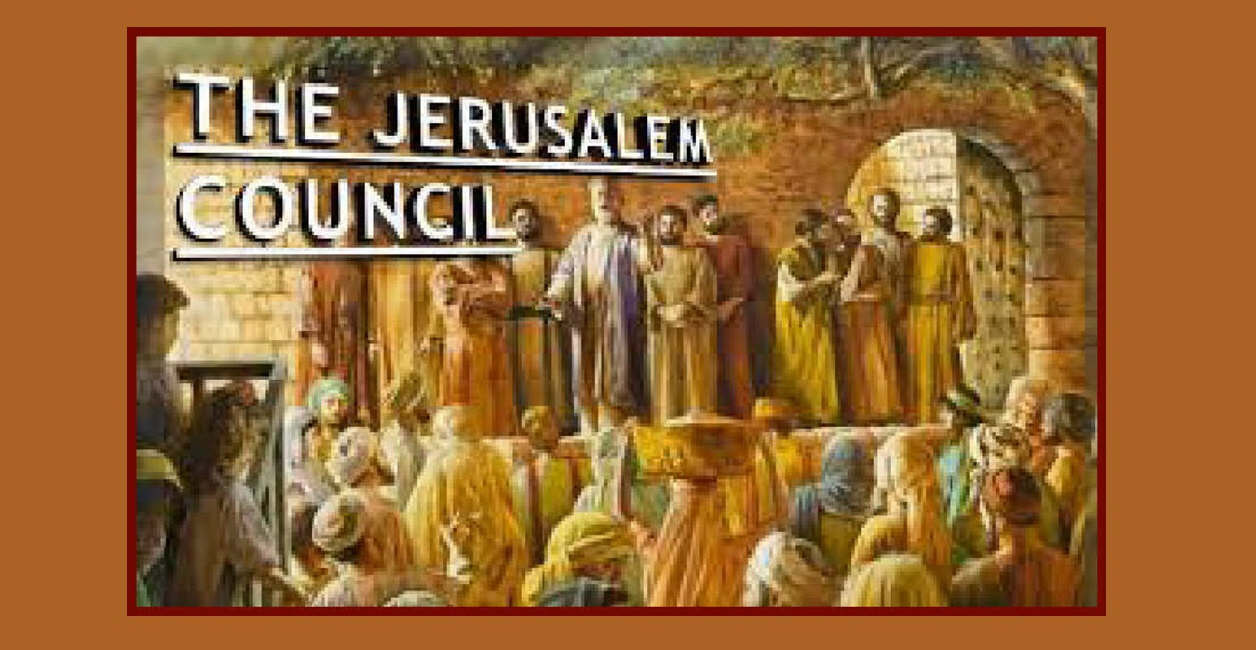
Pluralism discussed at the Council of Jerusalem
Is there only one way of being a good Christian? Should circumcision to be mandatory for all, as some Christian Jews wanted? That’s the question discussed at the Council of Jerusalem.
Jesus had prayed “that they be one,” as the Father and the Son are one. St. Paul had similarly asked Christian converts “to preserve the unity of the spirit through the bond of peace: one God, one faith, one baptism, in one God and Father of all.” (Eph 4:3) Paul gave clear recommendations: achieve unity through the bond of peace; avoid words and deeds that weaken peace in order to preserve the unity of faith.
At the Jerusalem meeting at around the year 48 AD, the topic of unity within pluralism was discussed and voted upon. James summarized the prevailing view: we must judge the tree by its fruit. “It is our decision and that of the holy Spirit [as shown in the conversions following Paul’ mission abroad, and Peter’s experience of the outpouring of the Holy Spirit over the household of the centurion Cornelius], not to place on you any burden beyond [basic] requirements.” Here is a model for us to follow: listen and see the fruits of the Holy Spirit at work in the world; then discuss, and come to a decision.
Most Christians come in contact with different religious groups. There are the Catholics, the Protestants, the Orthodox, and the many small Christian churches and sects. There are also the Jews, Muslims, Hindus, Buddhists, and others. Within the Catholic church, there are different and sometimes opposed groups. We must follow the example of the council of Jerusalem: judge the tree by its fruit, see the good in all of them, then discuss unity within pluralism, and define a common attitude, one of mutual acceptance through the bond of peace.
Here is the prayer of Jesus for unity. “I pray not only for them but also for those who will believe in me through their message.
That all of them may be one, Father, just as you are in me, and I am in you.
May they also be in us so that the world may believe that you have sent me.
I have given them the glory that you gave me, that they may be one as we are one
—I in them and you in me—so that they may be brought to complete unity.
Then the world will know that you sent me and have loved them even as you have loved me.
August 29 - September 5
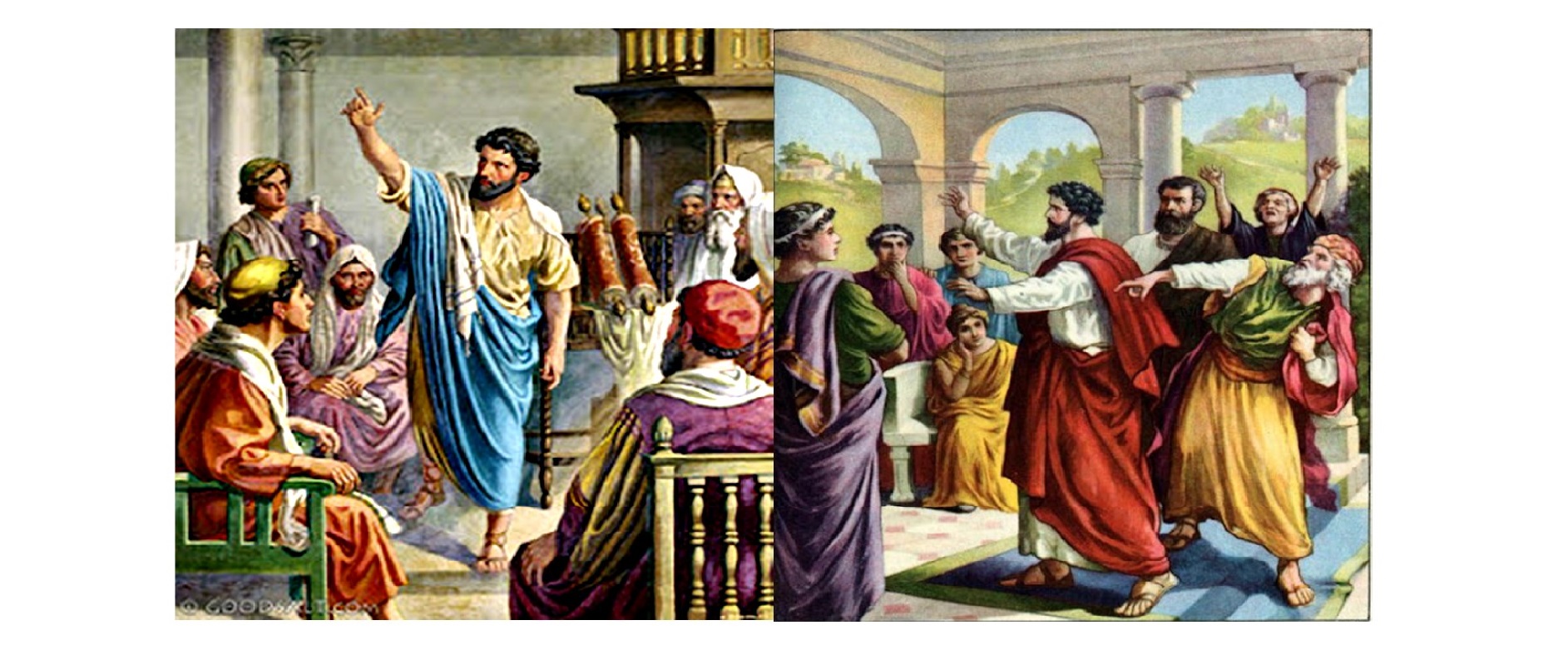
Preaching boldly: St. Paul on his first trip
Back to the book of Acts. In Antioch in Pisidia, Paul “spoke boldly” but he antagonized his Jewish listeners. “Your leaders killed the messiah. Moses and David vanished in corruption, but Jesus was raised incorruptible.” For Paul, those who do not accept this message are “unworthy of eternal life.” People were given only two options: convert or you will be “unworthy of eternal life.”
The conversion of Jews to Christianity split the synagogues into two camps, and this created much tension. In the land of Israel, the Jews expelled the Christians from their synagogues, and later, Christians expelled the Jews from their lands for many centuries. One cannot be both a Christian and a Muslim, or a Christian and a Hindu, but one can be a Christian without hating Muslims, or a good Muslim without hating Christians, or a good Hindu without persecuting Muslims. In many places throughout the world, Christians, Muslims, and Hindus kill one another. We need a missionary spirit of boldness without antagonizing people.
There are good things in all religions. It is important to mention the good before the bad. Communication theorists suggest that we should say eight or ten times more good things about spouse and children than bad things. By saying good things about people, they become ready to listen. Then the Holy Spirit can do its work. As Francis of Sales said, “One attracts more flies with honey than vinegar.” We should be honey to others, and thus create loving relationships across dividing lines.
Here is the prayer of St. Francis de Sales (1567 –1622), the missionary who converted people with honey rather than vinegar:
"Have no fear for what tomorrow may bring,
The same loving God who cares for you today
Will take care of you tomorrow and every day.
God will either shield you from suffering
or give you unfailing strength to bear it.
Be at peace, then,
and put aside all anxious thoughts and imaginations. Amen.”
August 15, 2021
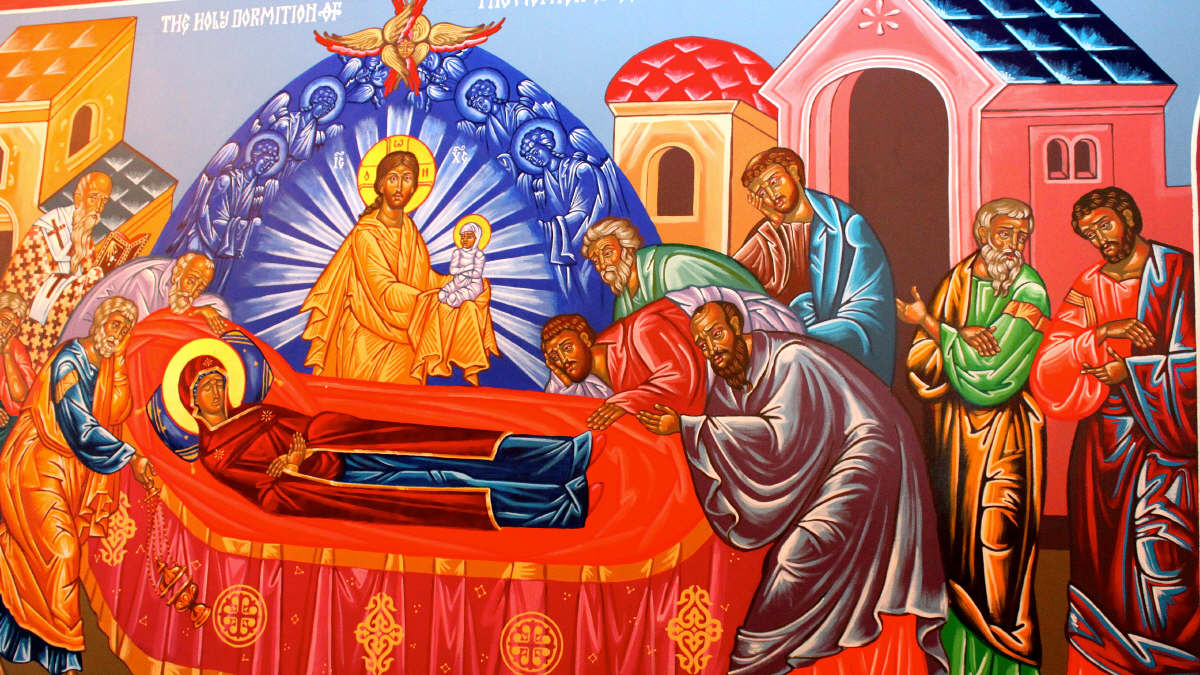
Mary's Assumption & Ours
May the angels lead you into paradise;
May the martyrs receive you at your arrival,
And lead you to the holy city Jerusalem.This is the chorus that is sung at a Christian funeral as the body leaves the church for its resting place. This is also the song that may have accompanied Mary at her Dormition or "falling asleep" (what the Assumption is called by Orthodox Christians). Dying is often called "falling asleep" in the liturgy, and waking up with the angels in the whole city of Jerusalem is the dream of all believers.
Mary was an ordinary woman who was taken to heaven. What did she do to deserve it? Nothing. Heaven is a gift that awaits us all; it is not a reward that is merited. Jesus rose from the dead, and so will we. Life and death are gifts; to recognize them as such is the source of great peace.
Today's reading reminds us, "As in Adam all die, so also in Christ shall all be made alive." We can now add, as in Eve all her descendents had lost their way to heaven, so in Mary, the New Eve (which means the mother of all living) we can find our way to Christ. She is represented in the book of Revelation as "clothed with the sun, with the moon under her feet, and on her head a crown of twelve stars." In heaven all wear a crown of stars, but you and I will only have a small crown of small stars. Mary is not only crowned with stars but also clothed with the sun and the moon.
It is customary since the time of the first Christians to venerate the martyrs and ask for their intercession. This devotion has continued through the ages. Devotion to Mary always leads to Jesus Christ. In heaven Jesus is surrounded not only by Mary and the twelve apostles, but also by all the heroes and saints of all ages, and all those who have been washed in the blood of the Lamb, and all are in constant interaction with the Lord of Lords. Hence it is appropriate to ask for their intercession.
Here are the next verses of the antiphon quoted at the beginning.
May the choirs of angels receive you,
And with Lazarus, once poor,
May you have eternal rest.You may like to listen to the Ave Maria by Schubert
or https://www.youtube.com/watch?v=xXsU44mu9zg
August 8 - Acts 12
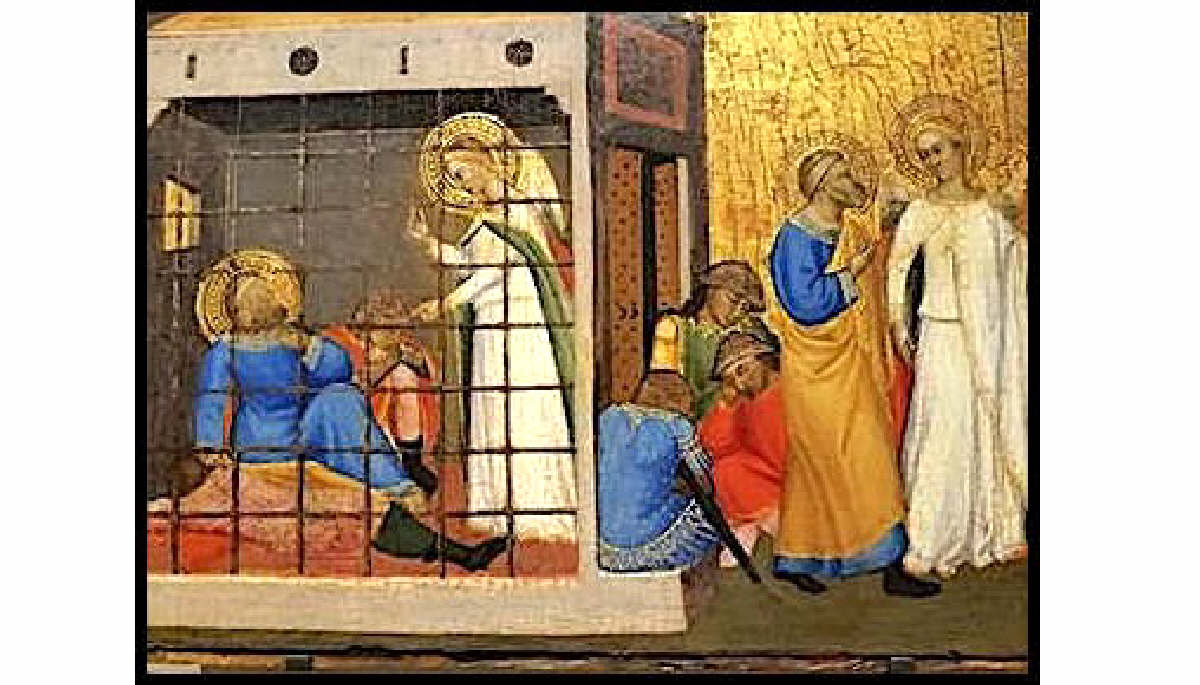
An angel leads Peter out of prison
This is one of the most beautiful stories of the New Testament. It was like a dream. While in prison surrounded by two guards, in the middle of the night an angel tapped Peter on the shoulder and told him to put on his sandals and belt, and to follow him. “They passed the first guard, then the second, and came to the iron gate leading out to the city which opened by itself.” Now Peter was in the street, and then the angel disappeared. “Then Peter recovered his senses and said, “Now I know for certain that the Lord sent his angel to rescue me.”
If such a miracle would never happen again, we would lose faith. It happens just often enough to keep up our faith and hope. Miracles happen in Lourdes and elsewhere, but as stated by the Director of the Bureau of Miracle Assessments, there are more “miracles” taking place in hospitals thanks to science than at the Lourdes grotto. Science can perform “miracles,” for which we must be grateful. When we recover from serious sickness thanks to science, do we say, “Now I know for certain that the Lord sent his angel to help me?”
There is another escape from prison narrated in the Acts of the Apostles. Paul and Silas were in prison at night, praying and singing hymns. About midnight, “there was suddenly a severe earthquake that shook the foundations of the prison, flew open all the doors, and pulled loose the chains.” Paul and Silas were free. They could run away. But when Paul saw that the jailer was going to kill himself, he shouted, “Do no harm to yourself; we are all here!” This could have meant going back to prison. Then another miracle happened: the jailer fell down before Paul and Silas and said, “What must I do to be saved?” Miracles can have unexpected consequences.
Here is another escape story, that of Joan of Arc, the girl from Loraine, France, who led the king’s army against the English. She was captured and put in prison in a fortress. At night she managed to jump off the window and started running away, but she had suffered serious bruises and was captured again. She had undertaken her mission at the call of Saint Michael, Saint Catherine, and Saint Margaret, yet she did not escape death at the stake at the age of 19. Here we have three miracles: Joan’s calling to become a military captain, her military successes, and her courage before death.
Life is full of unnoticeable miracles. Here is a beloved psalm, The Lord is my Shepherd or https://www.youtube.com/watch?v=ixLgtlr_7Gw (Skip the Ads)
July 25 - August 1: Acts 7

The martyrdom of St. Stephen
Stephen is the first among many who signed with their blood their allegiance to Jesus of Nazareth. He is the first-born of the holy martyrs. Many martyrs were not perfect, but they overcame fear of death by the power of God.
The believers of Jerusalem had become quite numerous. Their common meals required no fewer than seven men to cook and serve at the tables. Stephen was one of them. He was also a miracle-maker and a gifted speaker. He made many converts in the synagogues he visited. This success created opposition. At the Synagogue of Freedmen, the opponents stirred up a crowd that confronted him, sized him, and brought him before the Sanhedrin with the accusation of blasphemy against Moses and God. In this crowd of accusers, Stephen’s face was “like that of an angel.”
To defend himself, Stephen embarked in a lengthy speech to prove that Jesus was the Messiah. He described in detail the vocation of Abraham, the four hundred years of slavery in Egypt, the story of Moses, the entrance of the promised land with Joshua, and Salomon’s building of the Temple. Then he concluded his lecture that may have taken half an hour with these incendiary words, “You stiff-necked people, uncircumcised in heart and ears, you are just like your ancestors who killed the prophets. You now have become the murderers of the holy one. You received the law but did not observe it.” This speech had an immediate effect: “They were infuriated and ground their teeth at him.” They dragged Stephen away and stoned him.
Even today, some people are so full of evangelical zeal that they antagonize and even insult those they want to convert. This is typical of new converts, and this was typical of the first generation of Christians. Of course, many of us are so diplomatic that we seldom get the message across. We must remember that only God converts the heart; we must foster work with courage, but without arrogance and purely human self-confidence.
Had Stephen been more diplomatic he would certainly have been killed, because this was what his opponents wanted. All apostles (save John the Beloved) paid with their lives their witnessing of Jesus Christ.
St. Stephen and all the holy martyrs, pray for us! Let us sing:Bless the Lord, my soul and bless God’s holy name. (SKIP ADS!)
https://www.youtube.com/watch?v=t4Svh-9ohg4
July 11 & 18 Acts 2:45-47

The ideal first Christian communities
“Everyday day the believers devoted themselves to meeting together in the temple area and to breaking bread in their homes. They ate their meals with exultation praising God…. There was no needy person among them, for those who owned property would sell them, and every person was given according to need.”
This ideal situation did not last very long. In St., Paul’s letters we learn that in Corinth and the province of Galatia in modern Turkey there was conflict. Paul never mentioned that in the communities he had founded people shared meals and possessions. After the fervor of Pentecost faded away, the first Christians became quite similar to us today.
Yet this ideal never disappeared. In all major religions there are religious communities sharing all things. In Buddhism there are monasteries of men and women. In Hinduism there are ashrams. In Islam there are holy men and the Sufi orders. Pietist communities emerged among Lutherans, and Mennonite brotherhoods among Calvinists. Today there are various religious groups of celibate and married members in Protestantism. In the Catholic Church religious orders and congregations have flourished for centuries.
Anthony of Egypt is the first well-known monk who withdrew into the wilderness in about 270, when at the age of 20 he heard in his parish the advice of Jesus to the young man, “Go, sell everything you have, and give it to the poor.” He withdrew into total solitude for a life of discipline. He ate only one meal a day, and never touched meat and wine. Many people would say that this kind of life is unhealthy, yet he lived to the age of 105! Actually, a vegetarian life of discipline is good for your health, and many vegetarians, monks or not, live a long life.
The ideal of the first Christians is still alive today. Very few people can join religious orders, but every family can be a small Christian community. Today the family refers to an extended community of relatives and friends rather than just mom, dad, and two or three kids. The ideal of the first Christians was mutual help so that nobody would be in need, materially and mentally, and giving praise to the Lord. We can still do that today.
In the weeks to come we will sing the songs of Taizé. Many of them are in Latin, because there are too many different languages in Europe and the rest of the world.
Ubi caritas and amor, Deus ibi est: (SKIP THE ADS!) Where there is love and mutual support, there we will find God. https://www.youtube.com/watch?v=G2o27qpvfUc
June 27 July 4 Book of Acts
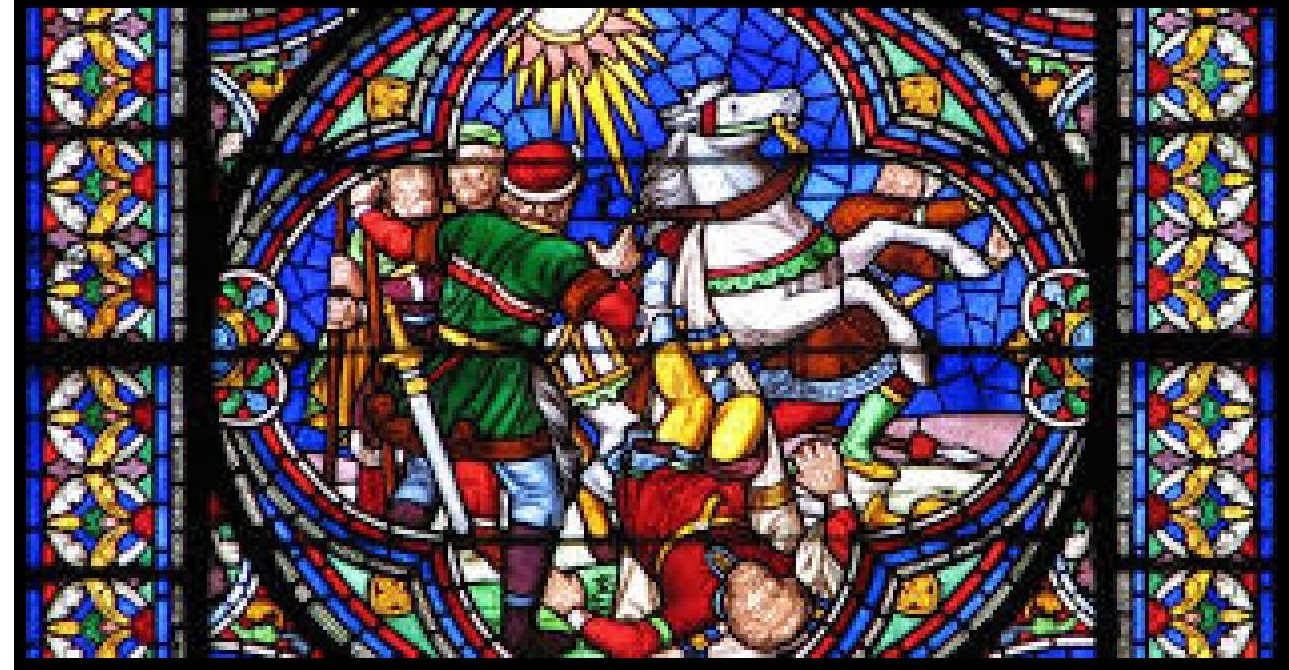
Saul on the road to Damascus
We begin our reflections on the book of the Acts with the conversion of Saul on the road to Damascus. His conversion is also typical of most conversions. Very few people ever had an apparition similar to that of Saul, but most conversions follow the same structure: first a blockage on the road, second a deep personal question about what to do, and finally an indication for the future, “Go, and you will be told what to do.”
Saul had been given letters to the synagogues of Damascus asking them to denounce the worshippers of the Way so that they could be brought back to Jerusalem in chains for a trial. On his way, he was thrown to the ground by a light and a voice saying, “Saul, Saul, why are you persecuting me?” This is the first step: a blockage on the road of one’s expectations. “I am Jesus, whom you are persecuting.” We do not know Saul’s answer to that. He could have said, “Good! I am arresting you.” Or, “Get out of my way!” He had only two options: rebellion or open-mindedness. It is likely that he said something like, “What do you want me to do?” Instead of being given a specific answer, he is simply told, “Go, and you will be told what to do.” Now this was his only choice: he had been blinded by the overpowering light and had to rely on others about what to do next.
We all have experienced failures and blockages in our expectations. Like Saul we have only two options: rebel or show open-mindedness. We can rebel and blame others, the system, or ourselves. Or we can learn from our mistakes. But the same failure can happen again and again. Or there may be a radical failure in health, family, or work. Then what?
A blockage on the road can be a test of our endurance. It can also mean that we are going the wrong way, and then something has to change. This is the time to pray, “Lord, what do you want me to do?” The answer will likely be, “Listen to others and learn from the circumstances.” Many conversions happened through a road blockage, but conversions often take years before finding a new a new and stable road forward.
This is what happened to Paul. A few days after his baptism, he started to preach in the synagogues, but this infuriated the Jews who wanted to kill him. Paul had to be lowered down the city wall at night in a basket. He went to Jerusalem and started to preach again. With the same results: the Jews wanted to kill him. This was a blockage in his ministry. He quit and left for his Tarsus, his home in Turkey. The time for his preaching was not ripe. A few years later he was called back to Antioch by Barnabas, and he started his very successful missionary trips.
“All things work for good for those who love God.” This was clearly the case of Paul whose initial ministry was a failure; indeed, there was an attempt on his life. It may be difficult to see failures and road blockages as signs from heaven, but there are only two options: to rebel or listen to others and learn from mistakes. It is painful, but all things work for good for those who love God.
Can you give a personal example?
June 13 & 20. Mark 12:17

“Give back to Caesar…
and to God what belongs to God"In antiquity, most states and city-states minted their own currency. What is special about the imperial coins is that throughout the Roman empire people had to use them to pay their taxes. Hence, “Give back to Caesar what belongs to Caesar” means: if you have Roman coins, it is only to pay your taxes. Otherwise, you should not use coins that bear the image of the Roman false god.
The Jewish currency was the shekel which bore religious symbols, not the images of kings or gods. The yearly Temple tax was a half-shekel. “To give back to God [what you received] which belongs to God” can mean: give everything you have back to God. In practice, the Jews offered to God the First Fruits of the harvest, or ten percent (the tithe) of their earnings.
There are many ways to give back to God what belongs to him. Most Catholics only give about one percent of their income to the church, but they also pay 15 to 30% in taxes depending on the country. We cannot give back all we have received except through worship and thanksgiving. Christians give thanks for the most precious gift they have received, namely the teachings, life, death, and resurrection our of Lord Jesus Christ. This thanksgiving worship has been called the Eucharist since the early days of Christianity. Any prayer is a “Eucharist” in a certain sense because we always pray through the intercession of Jesus the Christ and savior.
The most important part of the Mass is the Eucharistic Prayer. In it we thank the Eternal Father for the gifts we have received, namely the holy Bread of eternal life and the Chalice of everlasting salvation. Usually, the priest recites this prayer in a low voice. Here is the text:
0 Lord,
as we celebrate the memorial of the blessed Passion,
the Resurrection from the dead,
and the glorious Ascension into heaven of Christ, your Son, our Lord,
we, your servants and your holy people,
offer to your glorious majesty,
from the gifts that you have given us,
this pure victim,
this holy victim,
this spotless victim,
the holy Bread of eternal life
and the Chalice of everlasting salvation.What follows is the Doxology and Great Amen. Listen to it and sing along. Two versions:
https://www.youtube.com/watch?v=9tKAB5NrtqU&ab_channel=StevenR.Janco-TopicStevenR.Janco-Topic
OR: https://www.youtube.com/watch?v=aq8wmgwmspc&ab_channel=TimothyR.Smith-TopicTimothyR.Smith-Topic
June 6, 2021. Mark 10:46-52
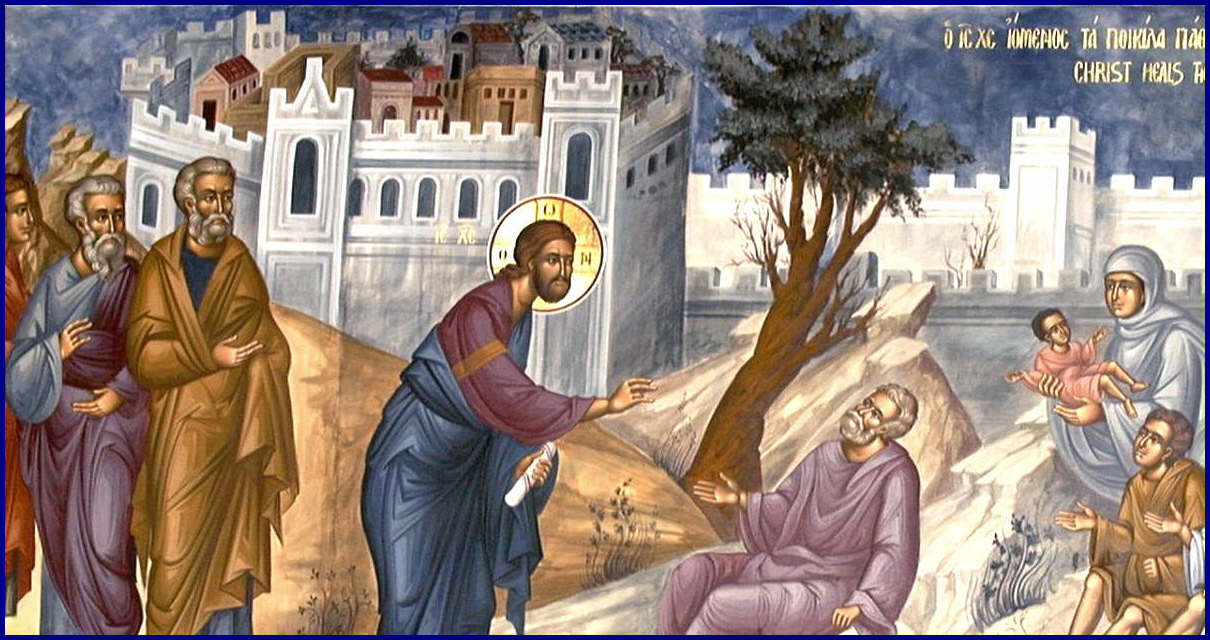
“What do you want me to do for you?"
The blind man of Jericho had been crying, “Jesus, son of David, have pity on me!” Now Jesus asked him the obvious question, “What do you want me to do” as if he did not know.
We often think, “God knows what I need. Why should I ask?” No. Asking for a favor is a process. Children are not always given what they want because they do not know what is best for them. Asking for a favor is not like putting money in a slot-machine and picking up what we want. Asking for a favor is a process that involves give-and-take on both sides.
Many Psalms are prayers of petition. Psalm 123 expresses the biblical attitude of humble but persistent petition. Listen to it, it comes with the text.
https://www.youtube.com/watch?v=gF_fCMYvof4&ab_channel=MichaeljonMurphyMichaeljonMurphy
On to you I lift up my eyes,
And O you who dwells in the heavens.
Behold, as the eyes of servants look unto the hand of their masters,
And as the eyes of a maiden look unto the hand of her mistress,
So our eyes wait upon the Lord our God,
Until he has mercy upon us.In prayers of petition, our eyes are lifted up to the Lord, waiting and waiting until he has mercy on us. The Psalm continues repeating, “Have mercy upon us, o Lord! Have mercy.” This repetition is an expression of hope, like the Jews waiting for the Messiah. When he came, Jesus was not what people expected. The answer to our prayer is not always what we expected.
The Lord is faithful. “All things work for good for those who love God.” (Rom 8:28) Is this true? Realistically, it does not seem so, but then you have given up hope. There is nothing worse than life without hope. We must conclude that the question, “is it true or false that God does not abandon us” is a rationalist question that judges God in the name of human rationality. It is better to say, it is our hope that the Lord will never abandon the people who trust in him, but we do not know how and when. When we lift up our eyes like servants to their master, we hope and wait, and wait in hope until he shows us mercy.
“What do you want me to do for you?” Lord, you know best. But I need your help!
May 23, 2021. Acts 2

Where is the Pentecost today?
Every year we read the story of the coming of the Holy Spirit on the apostles, but where is the Pentecost today? “John baptized in water, but you will be baptized with the holy Spirit.” Where is it?
When the Holy Spirit came on Pentecost day amidst a great storm of wind, people rushed to find out what happened. “They were astounded and asked, ‘How does each of us hear them in his own native language?’” They were astounded and bewildered, but not transformed. Some even said “They have had too much wine.”
The bystanders on Pentecost Day were outsiders, witnessing an event which they did not understand and for which they were not prepared. The apostles had just spent ten days in prayer, reflection, and reminiscence of Jesus’ words. Through the history of the church when people spend time in reflection and meditation of Jesus’ words, they experience an influx of the gifts of the Spirit—but not bystanders.
There are many gifts of the Spirit, and different people get different gifts. Francis of Assisi experienced many miraculous gifts, but not Theo and the other of Francis’ followers, yet Leo played an important role in the development of the Franciscan order.
There are natural as well as supernatural gifts. The history of the church is conditioned very much by the natural gifts of the popes, most of whom did not have miraculous gifts, yet they deeply affected the church. With our natural gifts, we can perform the supernatural deeds of faith, hope, and love, and this is what the Pentecost is about.
“Those who did accept him —born not of blood nor of the will of the flesh, but of God—he gave the power to become children of God” (John 1:12) This is the miracle of Pentecost in everyday life, and this still happens today. Let’s be ready for it.
Let us sing Veni Sancte Spiritus, which is song by ordinary people like you and me.
https://www.youtube.com/watch?v=us-v4slsUX4&ab_channel=ElizabeatElizabeat/
May 16. Mark 10:17-31

The rich man & cheerful giving
“Good teacher, what must I do to inherit eternal life?” The young man was so eager that “he ran up to Jesus, knelt down before him,” out of desire to learn what to do for eternal life. Young people are often eager TO DO things, to get involved in activities and organizations. He must have been disappointed when told to practice the Ten Commandments. “But I have done this all my life! What else can I do?
“Jesus, looking at him, loved him.” Jesus loves those who say, “What else can I do?” Actually, most teachers, most leaders, and most employers love such generous young people. “God loves cheerful givers” (2 Cor 9:6). We all love people who give of themselves, the cheerful participants in activities and even social life.
Then came the unexpected answer, “Go, sell what you have, and give it to the poor.” No! That’s too much! Double the tithe, ask for 20 percent of my income, but not my whole fortune! That’s unreasonable. The young man then made the unretrievable mistake: he walked away.
None of Jesus’ disciples had given away their fortune for the simple reason that they did not have any. Peter and John owned a fishing boat and fishing nets, but they did not sell them to give their proceeds to the poor. One can be a following of Christ and still own properties.
Jesus benefited from the financial means of his disciples. Luke mentions Mary of Magdala, Joanna, the wife of Herod’s steward, Susanne, “and many others who provided out of their resources.” Nicodemus was a Pharisee and a member of the Sanhedrin, hence well off. He came to Jesus by night but did not understand the need to be born from above. He joined Joseph of Arimathea with the embalming spices necessary for preparing the body of Jesus for burial. Throughout the ages the wealthy have generously helped the churches and its missionaries out of the generosity of their hearts.
Wealth may be an obstacle for the kingdom. On the other hand, it is easier for everyone to give from one’s excess than from one’s needs. Are you rich? Then you can give from your excess. Take advantage of your wealth to create treasures of gratitude, not just in heaven but first down here on earth. Remember: God loves cheerful givers!
May 9. Mark 9:38-41
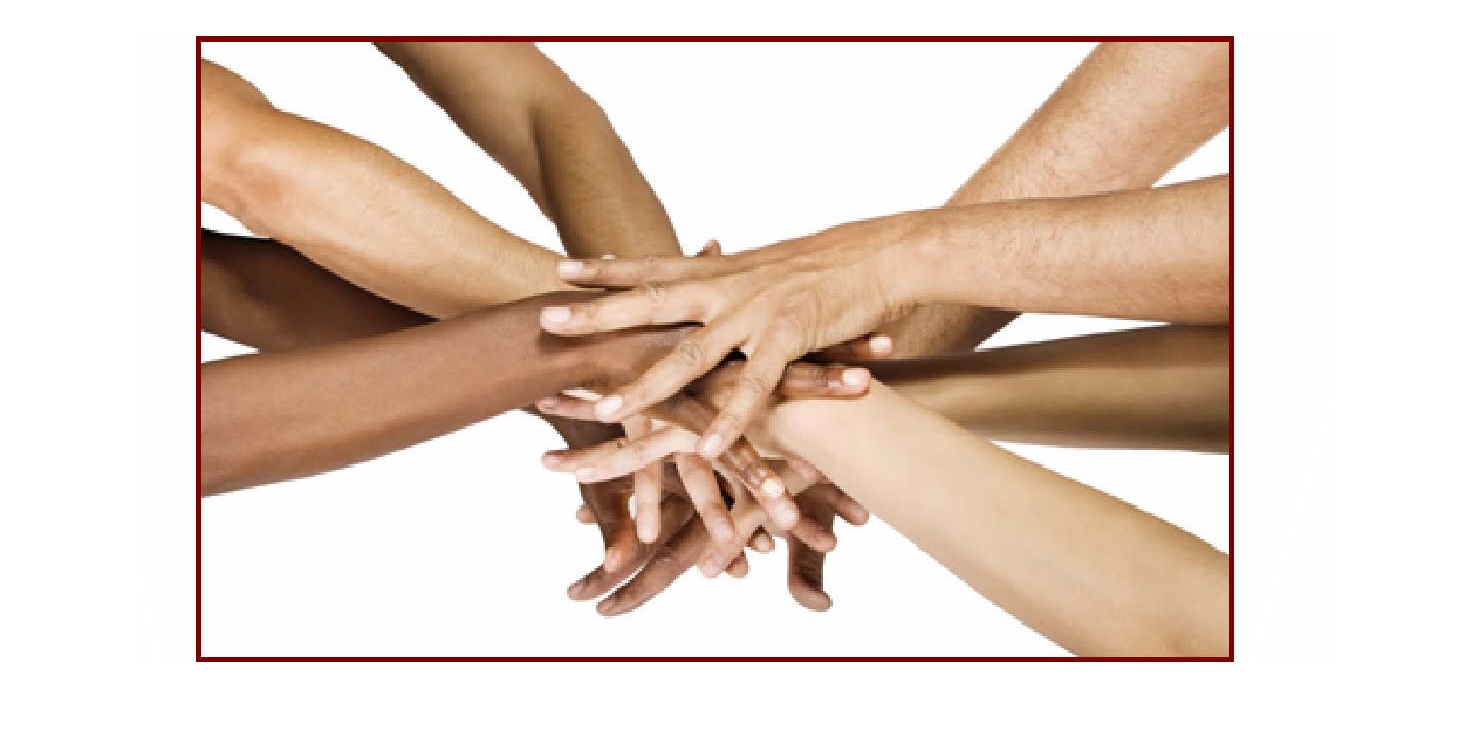
“Who is not against us is for us.”
John, one of the twelve, wants to prevent a separate group from casting out demons in the name of Jesus. “No, said Jesus, one who performs mighty deeds cannot at the same time speak ill of me. Who is not against us is for us!” There are many Christian churches and denominations that do great work, but we do not see them as being “for us.” Jesus even added, “Whoever gives a cup of water [to these separate groups] will surely not lose his rewards.” Helping and supporting separate groups or churches will have its own reward, because helping others—the Samaritans if you are a Jew, or Protestants if you are Catholic, or Catholics if you are Protestant— are good deeds that surely will get thedir reward.
St. Paul felt the same way. While in prison, he found that some people “preached Christ from envy and rivalry.” They took advantage of his absence to promote their own agenda. Paul was aware of it. “They preach out of selfish ambition, to cause me trouble in my imprisonment.” What to do? To have them silenced, as John wanted to in reference to casting out demons? For Paul, “whether they preach in pretense of in truth, it makes no difference, since Christ is being proclaimed.” He goes even further, “in that proclamation of Christ, I rejoice.” In the following centuries down to us, such generosity has seldom been the case, as competing churches often excommunicated one another.
I asked the same question to Carlos in Guatemala. At age 18 he wanted to enter the seminary of the Franciscans, but his parents were opposed to it. “My suitcase was packed, but I gave up when my parents did not relent.” He is now a university professor. He is also very involved in his parish. He is the coordinator of evangelization which includes all groups of the parish: the Charismatic Renewal, the Neocatechumenate Way, the Cursillos, and the small parish prayer groups. Everything is done in teamwork. For instance, during Lent they celebrate each station of the cross in a different house. “We tell people, ‘We would like to celebrate such and such station in your home,’ and people will say ‘Of course, with pleasure!’ So we go from house to house to announce the Passion. In each house we have bible reading, a reflection, and a prayer.”
Many Evangelicals and Protestants also go from house to house and knock at the doors. So I asked him, “Are you in competition with the evangelicals?” He was surprised. “How? Having for so many years been in the vineyard of the Lord, I do not see it as competition but as another way to bring people to Christ, which, in the end, is the most important, whether as Catholics or Protestants. Of course, I would like them all to be Catholic because of the sacraments, especially the Eucharist; they miss that treasure we have. However, this is the testament that the Lord has given us: it is to love one another. At the end, how many Masses you attended or how many biblical verses you memorized, this is not what will count.” Can you say the same?
May 2, 2021. Mark 9:14-29
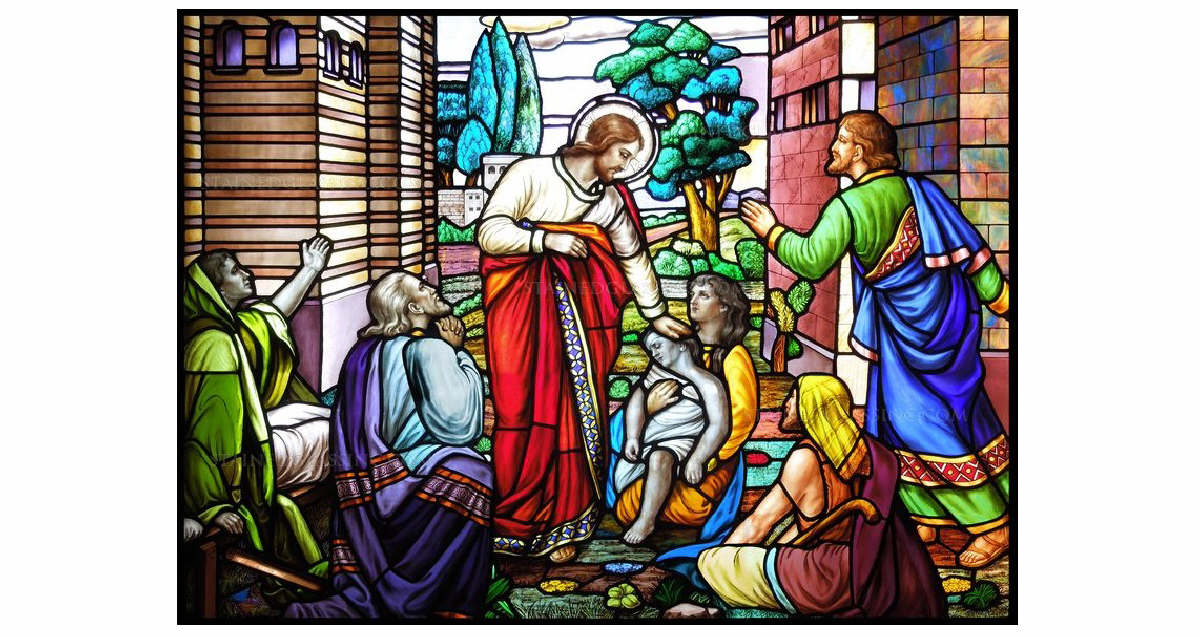
Jesus heals the sick boy. Does God still heal today?
The story is simple. A crow surrounds a boy suffering from epileptic seizures (“he foams at the mouth, grinds his teeth, becomes rigid, is thrown to the ground”) but the disciples could not do anything. Why not? “This kind can only come out through prayer.” Jesus also said, “Everything is possible to one who has faith.” Many people have faith and many people have prayed, but there was no miracle. What can be done?
Here is a true story. When the father of a pastor got sick to the point of death, the whole congregation prayed for his recovery. He recovered miraculously. Some years later, the father get sick again; the whole congregation prayed again, but the father died. The pastor bitterly complained to God, “You said, ask and you will be given. My father died: where is your promise?” Jesus answered, “I know what it is to lose your father. I had to bury mine, I had to bury Joseph. There is a time for healing, and there is a time for crying.”
The most important healing is that of the heart. Even if healed physically, an angry person remains angry. Science heals millions of people in hospitals, but will they give thanks to God for it, or boast about their recovery? Many of us have been seriously sick, some in childhood, some in an accident, some in a bout of cancer, and we recovered. Have we become more grateful? After a serious sickness, we are just happy that it’s over, and we forget about it. Give thanks God? Sure! For a minute or two, but it won't be a life changer.
There is a time for healing and there is a time for crying but the choice is not ours. Any suffering, not just physical illness, is a time of crying. To heal the crying, one must heal the heart. Major suffering brings with discouragement, depression, anger, resentment, even destructive and suicidal thoughts. Then the heart is bleeding from a lack of hope. But Jesus is the Emmanuel, God with us, especially in times of hopelessness.
What is instructive is that many people praying for physical healing first find a healing of the heart. Once the heart is healed, physical healing is less important. One recent example is that of Eric who suffered from a cancer of the stomach that made him feel half-dead. At a prayer meeting, he heard a prophecy that said, “One person in the assembly suffering from a cancer of the stomach will be healed today.” Eric knew that it was not for him. So he said, “That’s all right. I am glad for the other person who was cured.” At the same time, he felt peace, as if his pain had been lifted. He died three months later, on Christmas Eve. His family and friends felt that he had really been miraculously healed.
Yes, God still heals today. Can you write an example?
April 25. Mark 9:1-7

The Transfigured Jesus is the risen Christ
“Peter said to Jesus, ‘Rabbi, it is good that we are here.’ He hardly knew what to say, for he was awestruck.” These are the two aspects of any divine manifestation: great joy, elation, and also great awe before the mystery of a cosmic reality that transcends us and reveals our smallness.
Peter had the same experience at the stilling of the storm when Jesus rebuked the wind and said, “Be still!” and there was a great calm. Imagine you are in the middle of a hurricane battering your town with rain and gale wind, and a voice suddenly says, “Be still” and there is a great calm. The great forces of nature make us feel what we are: small, minute, minuscule, and filled with terror and awe. At the stilling of the sea, the apostles were filled with awe, but also admiration: “Who is this, that he commands the wind and water.” At the Transfiguration, Peter could have said similarly, “Who is this, that Moses and Elijah speak to him?”
At the Transfiguration, a voice came out of the cloud saying, “This is my beloved Son. Listen to him.” This is the eternal good news from the Creator: you have my beloved Son to listen to. You have his example to follow, and there are the four written gospels to learn from.
The same happened at the Resurrection. Early in the morning, three women went to the tomb and found the stone rolled away. They looked inside and saw a supernatural appearance who said, “Don’t be awestruck! The Jesus you seek has been raised!” Of course, they were awestruck: seeing an angel and learning about a crucified man raised from the dead was more awesome that the Transfiguration and the stilling of the sea. “They fled from the tomb, seized with trembling and awe.” Originally the gospel of Mark ended with, “They said nothing to anyone, for they were awestruck.” That’s the best testimony to the authenticity of their vision: fiction and imagination can make you tremble but not dumbstruck. Now all the apostles wanted to learn what happened that was so powerful.
The same had happened to Zachariah when an angel from the Lord appeared to him. “He was troubled, and fear fell upon him.” Then angel said to him, “Don’t be afraid. Your wife will bear you a son.” At the stilling of the sea, Jesus had said, “Why are you afraid? Have you no faith?” The archangel Gabriel could similarly have said, “Why are you afraid? Have you no faith?” Because Zachariah showed little faith, Gabriel said to him “You will be silent and unable to speak.” When people outside the Temple realized that Zachariah was literally dumbstruck, they wanted to know, and quickly everybody knew what happened.
The same happened when the women returning from the tomb were unable to speak: everybody wanted to know, and quickly everybody knew. They all remembered the voice from the cloud: “This is my beloved Son. Listen to him.” This is the eternal good news: the beloved Son rose from the dead. Listen to him! This is also the message for us today.
April 18. Mark 16:15, 19
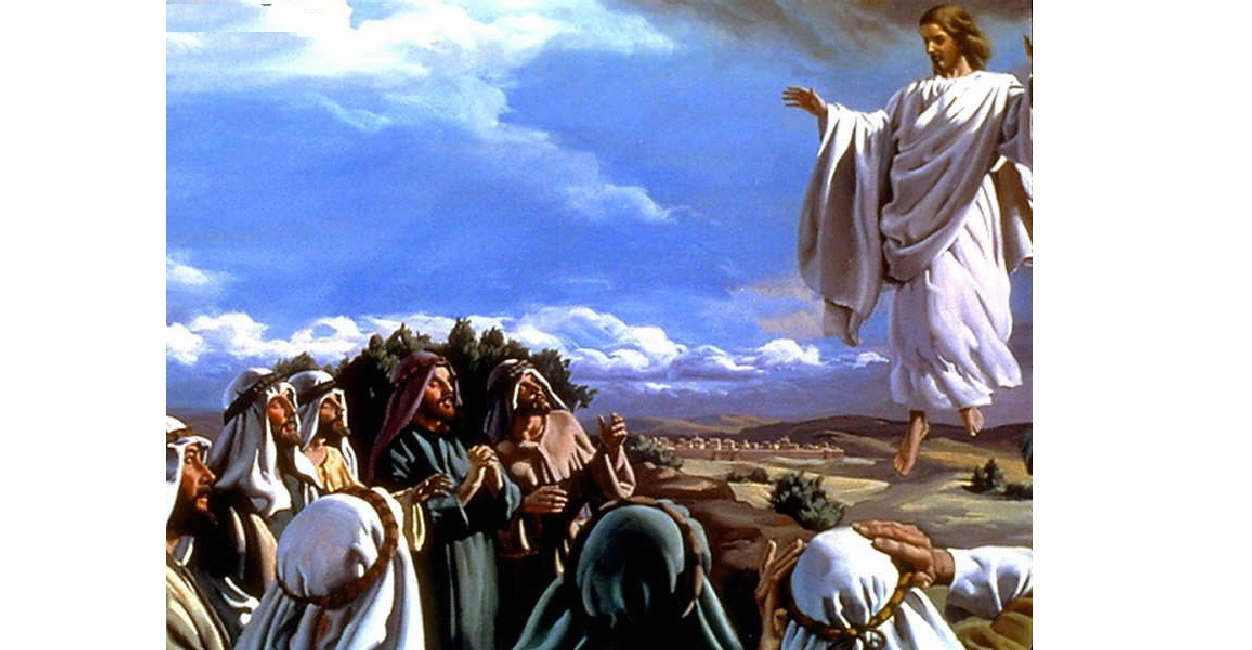
“Go proclaim the gospel to every creature”
The gospel of Mark, like that of Matthew, ends with a call to spread the gospel. Mark’s last words are very encouraging, “They went forth and preached everywhere, while the Lord worked with them and confirmed the word through accompanying signs.”
Much of Christianity has been a history of worldwide preaching. Peter and Paul went to the capital of the Roman Empire. Andrew preached in Asia minor. Thomas went to Syria and India. Philip proclaimed the word in North Africa. Matthew ministered in Persia. Bartholomew went to India and later to Armenia. John was the leader of the church of Ephesus where he died a natural death. After the death of the apostles, the Christian faith continued to spread like wildfire, although Christianity was an illegal religion.
The 19th and first half of the 20th centuries were time of great Christian expansion in Africa and the Far East. Since then, the missionary effort has slowed down. Many Catholics are reluctant to give money for missions; they feel that the money would be better used in humanitarian efforts, like in health or food improvement. Other Christian churches are still committed to the work of evangelization because faith is most important to them. How important is your faith to you?
As is well known, Christians in general and Catholics in particular are less religious in the West than in Africa and Asia. In the sub-Sahara countries, 81% of Christians attend church weekly or more often, but only about 40% do so in the US, and Catholics only half that number. In a few European countries, Sunday church attendance is down to 10% or less. In Africa, 69% of Christians fast during Lent. In the West, fasting during Lent seems to have disappeared.
How important is religion in your country? There is again a great difference between the West and the rest of the world. Here are the percentages of people who believe that today religion plays a less important role than in the past. In the US, 64%; in Canada; 51% in Germany 51%; in Spain 65%; in France 38%; and in Australia 63%. Quite different are the view of people elsewhere. Only a minority feels that religion is less important today, namely 10% in the Philippines, 22% in India, 6% in Indonesia, 18% in Nigeria, and 18% in Brazil. If you believe that the role of religion is declining, why would you give money for its missionary work?
“Go proclaim the gospel to all creatures!” This remains the mandate of the risen Christ. The apostles did so from Jerusalem, to Samaria, to the rest of the world. This is also the way we should proceed: begin with the family, that is, your children, then, if possible, your parish education program, and later if at all possible, in wider circle.
April 11. Mark 8:1-10
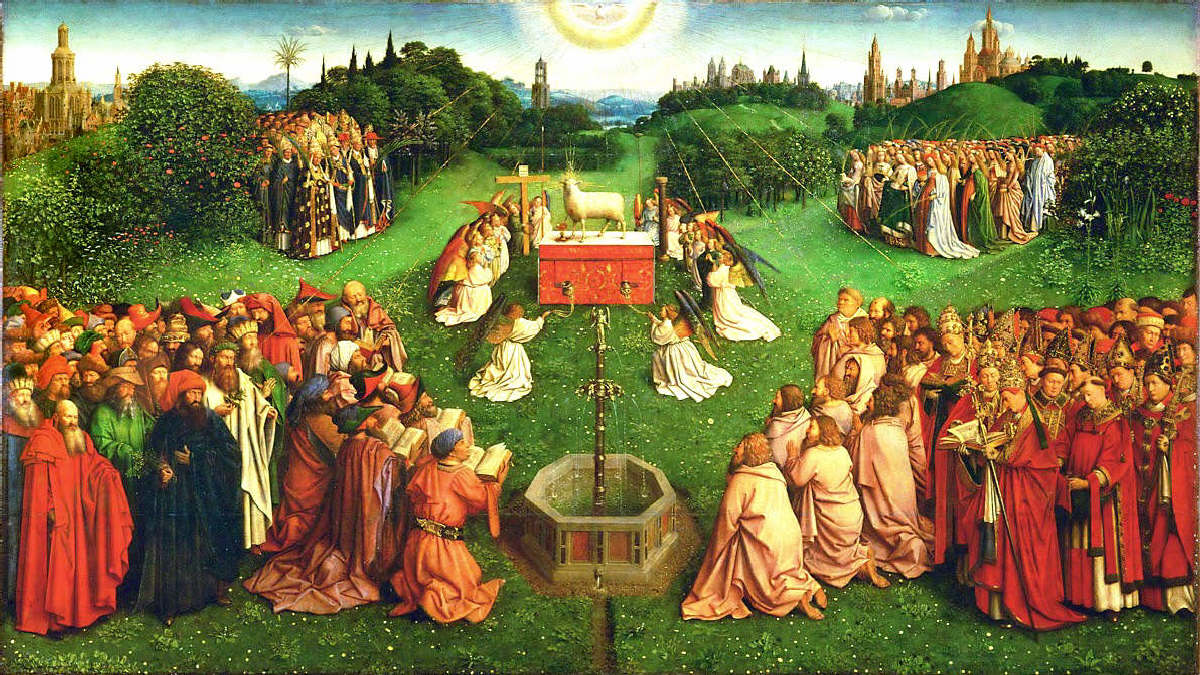
The Easter joy of the heavenly banquet
“The kingdom of heaven is like a king who prepared a wedding banquet for his son. He sent his servants to those who had been invited to the banquet to tell them to come but they refused.” Then the kind sent his servants to the streets and invite all, good and bad, and they filled the wedding hall. All are invited. Some will refuse. Some will come wearing inappropriate attire and will be thrown out. For all the others, it will be a sumptuous feast.
Blessed are the servants the master finds ready when he comes. Then the unbelievable will happen. “He will fasten his belt and have them sit down to eat, and he will come and serve them. Even if he comes during the middle of the night, or near dawn, and finds them ready, blessed are they.” Even in the middle of the night the Master will have them sit and serve them. At the Last Supper, Jesus demonstrated this attitude by washing the disciples’ feet.
The messianic banquet had been foretold by Isaiah. “The Lord of host will provide for all people a rich feast… He will destroy death forever. The Lord God will wipe away the tears from all faces. (Is 24:6-8). There will be more there than food and wine. No more death! No more suffering. No more tears!
This messianic banquet is also the eschatological feast in the new Jerusalem, when a loud voice from God’s throne will proclaim, “Behold, God’s dwelling is with the human race. He will dwell with them and they will be his people. He will wipe every tear from their eyes, and there shall be no more death or morning, wailing or pain, for the old order has passed away.” (Rev 21:3-4) These are the happiest words that human ears can ever hear.
April 4-11. Easter Sunday.

“I am with you until the end of time”
This is the happiest news the world could hope for: He is alive! He will be with us until the end of time, Alleluia! For the disciples, all the encounters with the risen Lord were moments of deep joy.
Early on the dawn of Easter Sunday, three women came to the tomb with expensive spices for the funeral anointing. Lo and behold, an angel of the Lord appeared and said, “Do not be afraid. Jesus who was crucified is not here. He is risen as he said. Go quickly and tell the disciples.” So, the women “departed quickly with fear and great joy.” Can you imagine the women running out of joy? Joy gives you wings to fly!
Mary of Magdala was weeping sorrowfully: “They have taken my Lord and I don’t know where they laid him.” Jesus said to her, “Mary!” The familiar sound of his voice touched her. She was moved to be called by her first name. She exploded in joy, “Rabbouni! Rabbouni!” and wanted to embrace him. “No, go and announce the good news to the disciples.” So she run. Good news always makes people run.
On the evening of that first day when the doors were locked, out of the disciples’ fear of the Jews and shame for their cowardice, Jesus stood in the midst of them saying, “Peace be with you.” The disciples rejoiced when they saw the Lord. Joy replaced fear, shame, and guilt as he said again, “Peace be with you!” There is no greater joy than the deep inner peace which submerges negative feelings with jubilation and exultation.
One week later, Jesus appeared again in the presence of Thomas. Tom’s soul was in turmoil: he had doubted the unanimous testimony that Jesus was alive. “Peace be with you, Thomas!” “Put his finger here and see my hand, and put it into my side.” Thomas was dumbfounded, amazed, and overcome with uncontrollable feelings. He did not know what to say, only, “My Lord and my God!” This is acknowledging one’s place in the universe. Nothing more needs to be said.Weeks passed. Peter and a few others went fishing but caught noting. From the shore came a voice, “Children, have you caught anything to eat?” They cast their nets again and where overwhelmed by the number of fish. Coming to the shore, they saw a charcoal fire with fish on it and bread. Jesus said, “Come have breakfast.” It was unreal, something like a dream. First, the miraculous catch of fish, then the ready breakfast of broiled fish and bread. It was a return to the miraculous feeding of the crowds with bread and fish. “Simon son of John, do you love me?” Peter was distressed. “Lord, you know everything. You know that I betrayed you three times.” When Jesus said, “Feed my sheep,” Simon knew he was forgiven and was again Simon the Rock. For him it was like a new beginning, the birth of a new self leaving the old self behind.
“I am with you until the end of time.” Peace and joy! The happiest news the world can hope for.
March 28. Palm Sunday.

The Passion: a human disgrace
The story of the Passion shows what we are capable of in our worst moments, like in genocides, extermination camps, slavery, or child labor. It shows the very nature of sin as a disgusting human disgrace.
- “Amen, I say to you, one of you will betray me, one who is eating with me.” There are traitors in most tragedies, but here the traitor is a friend eating at the same table. Disgraceful.
- “The man I shall kiss is the one.” There was no need of such disgraceful travesty of friendship because Jesus was well known. “Arrest him and lead him away.” Judas not only betrayed him but also organized his arrest. Disgraceful.
- Before the Sanhedrin, one witness testified, “Destroy this man-made temple, Jesus had said, “and I will build another not made of human hands.” What kind of accusation is this? Disgraceful witnessing.
- “Are you the Messiah, the son of the Blessed One?” There had been quite a few messiahs in those days, and all were sons of Adam and sons of God. This was a disgraceful trap.
- The accusation before Pilate was not blasphemy but political threat to the Roman establishment. Now the accusation is a power game. Pilate found no grounds of condemnation but had him scourged and crucified. This is disgraceful cowardice.
- The soldiers assembled the whole cohort and gave free rein to their fury of cruelty. They placed on him a crown of thorns, striking his head with a reed and spitting on him, saying, “Hail, King of the Jews!” This is like a mob lynching during American slavery.
- After he was crucified, those passing by said, “Save yourself by coming down from the cross.” The scribes and chief priests likewise mocked him, “He has saved others, and he cannot save himself.” Disgraceful sarcasms in the face of death throes.
During the veneration of the cross on Good Friday, the choir sings the Improperia ("My people, What have I done to you?") (https://www.youtube.com/watch?v=Ynf-2i01nqg&ab_channel=PapalMusic)
March 21. Mark 6:7-13

The sending of the twelve, to be God’s voice and feet
Jesus went around the villages preaching the good news from God, but during the week people were too busy to listen to this visiting rabbi. On the Sabbath, however, they were all ears. The harvest is great but the laborers are few. So Jesus sent his disciples ahead of him.
For the disciples it was like the first days of following Jesus, but now it was their turn to announce good news from God. They preached like Jesus. “I have good news for you. The fullness of time has arrived: the reign and rule of God are at hand. Believe in this good news. The bad news is that we do not know when. Change your way of life so that you'll be ready when it comes.” People were astounded by such daring preaching: they all wanted to know more.
The disciples simply repeated Jesus’ teachings. “You are the salt of the earth.” It takes very little salt to give taste to food. A good word, an encouragement, a show of support, an email to keep the relationship alive, a smile at the right time, all these leave a good taste at the end of the day. Conversely, a bitter word, a sign of rejection, a lack of empathy, an embarrassing silence, and hardness of heart are like vinegar in relationships.
The disciples also repeated Jesus’ most famous parable, that of the sower. We have all received good seeds since childhood, mostly at home, but also at school, church, and work. Do you remember your first six or eight years? These were times when the seed of obedience was sown. In adolescence were sown the seeds of responsibility and initiative. American schools emphasize individuality, but we need more than individualism. Sports and work have sown the seeds of cooperation: we all need one another. “Whatever you do the least of my brethren you did to me.” All these seeds take years to germinate and grow.
Love God and love one another: this is the most difficult seed to grow. Love of God has ups and downs. It does not last very long because it is difficult to see and practice. The business of life smothers it. Loving one another is often seen as emotionalism, or at other times as a small change given to a beggar. It is the seed that we need to foster most.
Parents are the sowers in their families. They are— we all are— the voice and feet of God, at home, work, and leisure time. The world needs them: the harvest is plentiful, but the laborers are few. We are among these few.
March 14. Mark 5:21-24; 35-43
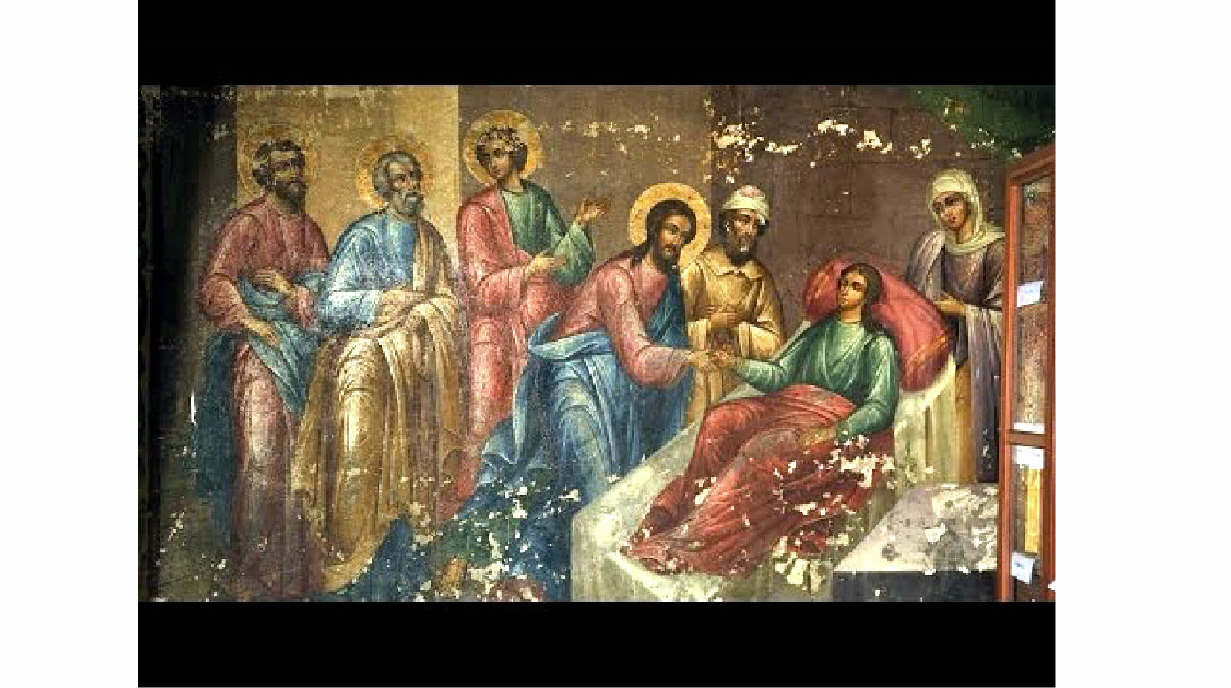
Jesus to Jairus's daughter, "Little girl, arise!"
Imagine the scene. Jairus comes to Jesus and throws himself at his feet and pleads for his dying daughter. Jairus was an official, something like a mayor or city council member; he is well-dressed while Jesus is a wandering rabbi in ragged country clothes. We can feel the crushing pain of this father at the imminent death of his daughter, and he would do whatever he can to save her. “Please come, and lay your hands on her so that she may get well and live!” How many people have prayed like this over the centuries, to St. Jude or to the Lady of Perpetual Help!
“She is dead.” No point praying anymore. Jesus heard the gloomy report of the messengers. “Do not be afraid,” Jesus said. “Just have faith.” For what, now that she is dead? Even in death and the worst circumstances we need faith, faith that God will not abandon us. In the case of the death of a child or spouse, the surviving members need hope in the daily struggles in the aftermath of death. Despair and depression may set in at this worst of times, just when one needs energy to cope. “I can’t take it. It’s too much!” To which Jesus would say, “Don’t be afraid.” Fear saps the energies when one needs them most. “What will happen to me? I have no resources.” Jesus would say, “Just have faith.”
“He took the child by the hand and said to her, “Talitha koum, little girl, arise.” This is what he will say to every one of us on the Last Day, “Arise.” We believe in the resurrection of the dead and the life to come. As the power of death could not hold Jesus in the tomb, so will the power God rise us from the ashes of our tombs. Half or more of the people in secularized countries do not believe in life after death. For them, life has no ultimate purpose; it is a flicker that shines and dies, purposeless. Why live? For consumption, wealth, fame, and power. No. In God’s foreknowledge all makes sense, because, “In everything, God works for the good with those who love him. Those whom he foreknew, he predestined to be conformed to the image of his Son, in order that he might be the first-born among many brethren.” What an encouraging perspective!
“She is not dead but asleep.” Jesus came to rise her from her death-like slumber. There are many ways to be asleep like death. Many people have nothing left to do when they retire: it is their work which gave purpose to their daily lives. For some retired people, life is like a sleep: every day and every week are like the previous ones; the years pass like sleeping through the days and the nights. “Arise from your slumber!” Jesus says to us. It is Lent, the time of cleaning up; it's spring cleaning! In Lent we should do something we did not do the rest of the year, a special practice, a special way to use our time. One suggestion: add moments silence to your daily schedule: 15-30 minutes without radio, television, computer, and mobile devise, just you and God. Try it!
March 7. Mark 4:35-41

Jesus calming the storm
There was a great crowd. It was the end of the day. People hang on to Jesus and did not want him go away. “Let us go to the other side of the lake,” he said. “They took him with them in the boat, just as he was,” that is, without provisions and sleeping arrangement. A sudden storm of wind broke up and threatened the boat. And Jesus was asleep on the stern. Panic: “Teacher, don’t you care that we are perishing?”
In the ancient world and in many Western folktales, the sea was the place of monsters and evil forces. Before the creation of the world, there was the universal chaos of water. “Jesus woke up, rebuked the wind, and said to the sea, ‘Quiet! Be Still!’” These are also the words Jesus said to the demoniac of Capernaum in the first chapter: “In the synagogue there was a man with an unclean spirit... Jesus rebuked him and said, ‘Quiet!’” Now Jesus rebukes not only evil spirit but the destructive forces of nature. It is like a new creation.
"Why are you afraid? Have you no faith?" It is difficult to have faith in the middle of a storm. It is only when we are in total desperation that we cry out, "Help!! We are perishing!" It is only when we have lost faith in ourselves that we turn to God. Understandably so. We first seek self-help. God is unpredictable. How many times has God calmed a storm in the world? To have faith is hard. "We know that in all things God works for the good of those who love him." (Romans 8:28). Yes, but what is that "good for those who love him?"
When Jesus walked on the water the apostles were afraid. "Why are you afraid? Have you no faith?" Peter regained control over his emotions, "Lord, if it is you, bid me to come to you on the water." And Jesus said, "Come!" So Peter walked on the water. "But when he saw the wind, he was afraid, and beginning to sink, he cried out, "Lord save me!" Jesus stretched out his hand and said " O man of little faith, why did you doubt?"
"In all things God works for the good of those who love him." What are these good things for those who love him? It is the ability to walk on water, as long as we have faith, but that does not happen very often. God rarely makes miracles for those who love him, but he keeps their faith alive. Faith is the most precious gift we may receive because faith gives hope and with hope, everything is possible. When the wind is strong and we sink into the water, Jesus stretches out his hand and says "Why are you afraid? Have faith!" With faith all things become possible.
February 28. Mark 3:7-35

“My family is those who do the will of God”
In this chapter of Mark’s gospel, “Jesus went up the mountain and called to him those whom he wanted (as his apostles) and they came to him.” Going up the mountain is the image of something important, like Moses on the Sinai. Jesus went up the maintain to give the Sermon on the Mount. He went up the mountain of the Transfiguration to show the image of his transfigured resurrected body. Now Jesus selects his 12 apostles. Simon is called “the rock,” but he was no rock at the time it counted most, during the Passion. Peter was called to be a rock, that is, to support his brethren after he bounced back from his failure. Peter was supposed to act as a rock among the twelve and all the apostles and disciples were called to be a rock among their followers. By helping one another, we create a new kind of family, the family of God's friends.
Shortly after choosing his apostles, members of his family came to see Jesus. The house in which he was preaching, probably Simon's house, was packed with people inside and outside, and there was no way to get close to him. So the relatives sent word through the crowd that they wanted to see him. "Who is my mother and my brothers? Looking around at those sitting in the circle Jesus said, 'Here is my mother and my brothers. Whoever does the will of God is my brother and mother.'"
Jesus created a new kind of association that did not exit before. Judaism was no special association: all Jews belonged to the Jewish people. Not all believers, not all Christians belong to the spiritual family of Jesus Christ, only those who do the will of God. During the first centuries when Christians were persecuted, all the members of the persecuted church belonged to family of God. Today there are regular churchgoers and also occasional practicing and non-practicing Christians. To identify as Catholic, Baptist, or Evangelical is not enough; one has to to do the will of God to be part of Jesus' spiritual family.
The will of God is to show love for neighbor and the Creator. This creates an invisible community. Churches are visible organizations to foster the love of God and neighbor, but they do not automatically constitute the invisible kingdom of God. Churches must inspire love of God and neighbor, but the Sabbath (and the churches) is for man, not man for the Sabbath (and for the churches). If your church does not serve your spiritual needs, go to another one. The churches must serve the people and the people must serve the church. We serve the church, first of all through our financial contributions but most importantly by participating in its activities. If your churches not need your services, find one where you are needed for the kingdom of God. The churches must be spiritual families where people are committed to the will of God as much as to their own families. Let us work for the renewal of our churches as families of God!
February 21. Mark 2:23-28

“The Sabbath is for man and not man for the Sabbath”
To this day, pious Jews are expected to follow strict rules about keeping the Sabbath, but in the Catholic Church of 50-60 years ago, the rules were equally strict. On Sundays, any kind of physical work was prohibited. Where I lived, the following were prohibited: any garden work like planting, weeding, or cutting the grass; any repair work in the house like painting, fixing, cleaning, improving, or extending; any kind of masonry, plumbing, or building; any work on the farm besides feeding the animals; any professional activity.
All stores were closed on Sundays, except the bakeries for a couple hours in the morning. No sports activities, no competition sports or training. What could you do? Practically nothing besides going to church. As a child, I often found the Sunday the most boring day of the week. Judaism was/is even stricter. The 35 rules for work (melachot) also include the prohibition of cooking, washing, sewing, tearing, knotting, spinning, dyeing, weaving, etc. and even writing. As in Catholicism, today few Jews follow these strict rules. At the time of Jesus, however, the rules were even stricter. Hence Jesus’ reversal of priorities: the Sabbath was made for man and not man for the Sabbath.
Fifty years ago, there was no such thing as the weekend. We had classes on Saturday morning and afternoon. In some professions, Saturday was only a half-day work but not in all jobs. During the week, the stores were open from 8 am to 12 Noon, closed for two hours for lunch, and again from 2 pm to 6 pm. All shopping had to be done during these hours which was impossible for working mothers. In short, for most people the Sunday was a welcome relief of rest after a six-day week of strenuous labor.
Today some European countries have a work-week of 35 hours and even a three-day weekend. This is a great gain, but only if the free time is used constructively. Now on weekends people can do all the things they could not do during the working days: gardening, house or car repairs, sports, and shopping. There are no more prohibited activities on Sundays. Sunday has become an ordinary day like all others. But now we have to change our priorities again: every weekday should become a Lord’s day not just Sunday.
The Lord God is the Creator of all seven days, Sundays and weekdays. Nothing is secular; everything is made in his image and semblance. “The time is coming when true worshippers will worship the Father in Spirit and truth,” not just on the Sabbath but on all the days of the week. This is actually much more difficult than just going to church on Sundays. “Pray in the Spirit at all times and on every occasion. Stay alert and be persistent in your prayers.” This was the advice of St. Paul to the Ephesians, long before there was a two or three-day weekend. Let this be our goal.
February 14. Mark 1:1-10

“You’re punished for your sins”
vs. “God forgives”The story of the paralytic of Capernaum is special in more than one way. Four men let a paralyzed man down on ropes through an opening in the roof. Instead of complaining for damage to the roof, Jesus admires their faith. Then Jesus says these shocking words, “Son, your sins have left you.” (2:5) This is a very common word (aphiemi: to leave, to release). When Jesus called Simon, “he left his nets” (1:18); when Jesus helped Simon’s mother-in-law to get up, “her fever left her” (1:18); after the temptation in the desert, “the devil left him.” At the end of a travel around the lake, they all “left the boats.” Now Jesus says to a sick man, "Your sins heve left you." What's the point?
“God punishes people for their sins; he never forgives:” this was a common belief in the Jewish culture of the time. It was similarly believed that poverty, failure in life and marriage were caused by personal failures. Conversely it was taken for granted that wealth, success, and social power were signs of God’s blessings for personal righteousness. Guess who propagates such views? Obviously the wealthy and the powerful to force the lowly to keep their places at the bottom of society.
In this context, to say that God can forgive sins is blasphemous. It means that the sick and the poor are not forsaken forever because of their sins leading to their poverty, and that the rich are not blessed forever because of their wealth. This is the language of insurrection, a call to reject this divinely sanctioned inequality. But for Jesus, the good news from God is that all things will be created anew. For him as for Mary in the Magnificat, “He has thrown down—or will— the rulers from their thrones but lifted up the lowly.”
It is still very common today to feel guilty when something goes wrong. “What did I do to God for him to take away my spouse/my child/my job/my money?” Then we blame both God and ourselves. Similarly, it is common (even if unconscious) to blame the poor for their laziness, the alcoholics for their lack of self-control, and overweight people for their self-indulgence.
When religious prejudices are anchored in collective beliefs, they tend to be as hard as rock, then and today. When Jesus said to the sick man, “Pick up your mat and go home,” the Pharisees objected, “It is against the law to pick up your mat on a Sabbath.” (John 5:10). How does Jesus heal the sick? “It is by Beelzebub, the prince of devils." And, “We know that God does not listen to sinners, but if one is devout, he listens to him.” (John 9:31) God punishes the wicked and never forgives; he blesses the self-righteous, and they will be wealthy forever. That's was the Old News
What are our prejudices about the poor, the sick, the uneducated, the immigrants, and all the bums of society?
February 7. Mark 1:29-31; 40-45
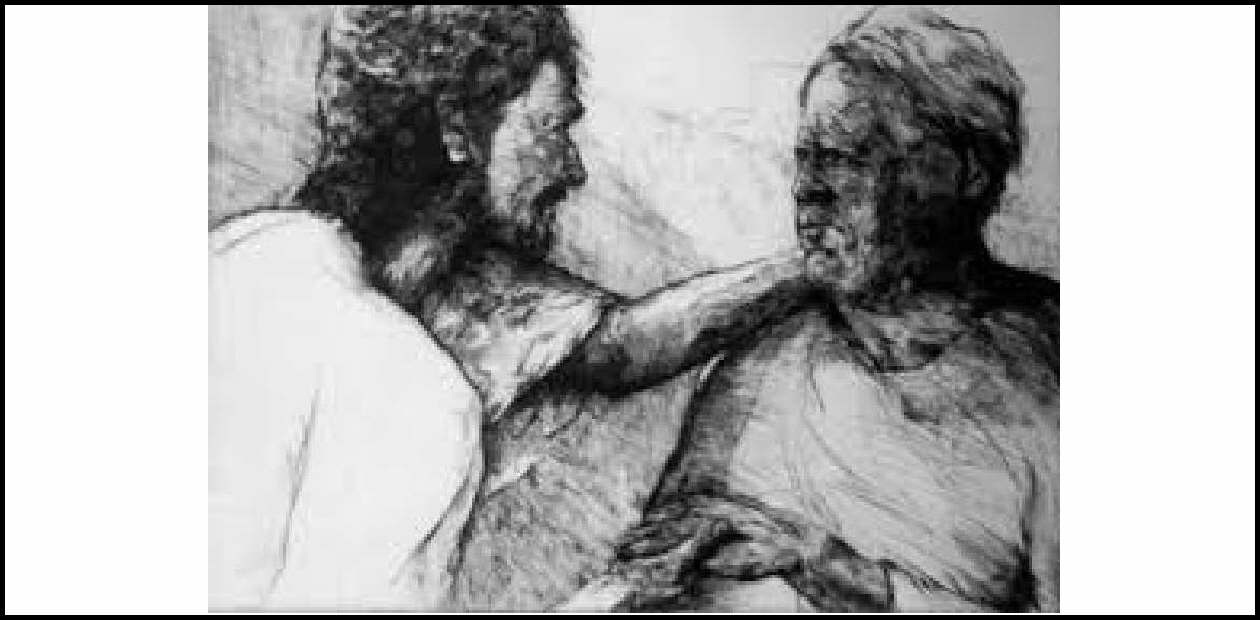
Moved by pity to help the leper
Jesus healed people because he was moved by pity, not in order to show his supernatural powers. His mission was to announced good news. God is bringing forth a new creation that will undo the chaos produced the evil forces in the universe, and this is the good news from God.
When in need, Christians pray for help, but secretly they hope for a small miracle, namely the restoration of health, escape from poverty, the end of family feud and violence, a steady job, social peace, or whatever. An estimated 5 million visitors go to Lourdes every year. Many or most return home spiritually healed, but without the hoped-for miracle. In the four gospels there is a total of less than 40 miracles over three years, which would be less than one in three weeks. Yet Jesus spent much of his time helping and comforting the sick and the under- privileged, performing a miracle only exceptionally.
Many of Jesus’s actions are symbolic, like changing water into wine, his first miracle at Cana, symbolizing the new creation as a joyful wedding. When Jesus entered the house of Simon, the lady of the house was sick. Jesus took her by the hand and she got up. This seems quite ordinary, unless we notice that in Greek Mark’s language is symbolic. The Greek says that she was “deadly sick” and Jesus “raised her up,” the word used by Mark to describe Jesus’ resurrection. After having been raised from a deadly sickness, she “served” the needs of the household. Jesus came “to serve and not to be served.” Serving is catering to the needs of others. This is what Jesus did, with maybe a miracle every three weeks. Jesus’ healing is the expression of divine love, only secondarily a sign of his divine power.
The healing of a leper is even more moving. Leprosy is contagious: you better not touch a leper or you may get that terrible disease. In Ancient Judaism the lepers were quarantined, not in their homes but as social outcasts. According to Leviticus, “He shall live alone; his dwelling shall be outside the camp.” Lepers must wear “torn clothes and let their hair disheveled.” Whenever they encountered someone, they must shout, “Unclean! Unclean! Stay away!” At this sight, Jesus was “moved with pity.” Instead of keeping a six-foot distance, “he stretched out his hand and touched him,” as a gesture of universal brotherhood. Now he had violated the law and become unclean himself. Now he had entered the unclear humanity which he came to save. “Be clean,” Jesus said. He could have said that from a distance, but he is the good shepherd who leaves the healthy sheep and seeks the lost and sick one. When he found it, he takes it on his shoulders, in an intimate contact. We can be good shepherds to others. No miracle is needed.
January 31. The gospel of Mark. 1:16-30

Simon Peter's Calling
The round building in the center of the picture was Peter's house. It was later surrounded by a small octagonal chapel, and later a bigger one. The house was near the lake, seen in the background. It was originally surrounded by a court yard and a shed for tools and animals. Capernaum was a small town. Many other houses have been excavated there. The town had a synagogue where Jesus preached after calling his first disciples. That day after the Sabbath service, Jesus went to Simon's house and healed his mother-in-law.
Simon and Andrew were busy fishing on the shore of the lake near their house. "Come after me and I will make you fishers of men." Obviously they went home at night. Jesus, too, was living in town. Jesus was an occasional preacher at the beginning of his ministry; there was little Simon and Andrew could do to help. For a long time, becoming "fishers of men" had little meaning for them.
At the beginning Jesus preached only on Saturdays in the synagogue. On other days he seemed busy meditating or praying: not a time to disturb him. Peter was married. He had to make a living to provide for his family. Obviously, Jesus did not preach family abandonment. According to Mark, “They abandoned their nets and followed him," but this happened over many weeks or months. Over the last twenty centuries God has called some to follow him and become fishers of people. This does not happen at once: seminary training takes five or six years, and longer in religious congregations.
In major universities professors are given a teaching or research assistant to help them. Nobody is given twelve of them. A professor could not teach a class with twelve assistants sitting next to him and doing nothing. Assistant professors, assistant lecturers, and teaching assistants are given specific assignments. Jesus similarly did not come to preach in a synagogue with twelve assistants. The twelve disciples had to learn specific tasks until they were ready to go by themselves in groups of two.
At the beginning Jesus only called Simon and Andrew. Weeks, or probably months later, he also called James and John. A tutor with two students will be busy and even more busy with four students. Then the group grew to six, eight, and even twelve. What did they do the whole day? What did they eat and where did they sleep? Jesus taught them everything: do not worry about what you ear. Do not worry about where to sleep. Look at the lilies in the field…
Knowing the everyday life at the time of Jesus helps to understand his message. Go to Capernaum and visit Peter’s house. I was there in 2000. It has been covered with a glass dome, and later a circular church with Peter’s house at its center. You can see this in the video linked to this page but ads are a nuisance. It may be quicker to copy and paste https://www.youtube.com/watch?v=Dy0sO8FlVw8&ab_channel=Sergio%26RhodainIsrael We know it was Peter’s house because of graffities on the walls. Only the foundations are left of the synagogue where Jesus preached.
January 24. The gospel of Mark. 1:12-13; 33-36

The temptation and the expulsion of a demon
After the baptism of Jesus in the Jordan, “At once the Spirit drove him into the desert, to be tempted by Satan.” Mark gives no details, just the essential: the confrontation with the powers of evil. God made everything good; he did not create evil. There is an outside force that appeared in the Garden in the form of a serpent, a snake, a dragon, a vampire, or whatever image you want to use.
Evil has many faces, even no face, or sometimes, the face of an angel in disguise. Evil is not a horned devil with a pitchfork to frighten children; it is a destructive force that stands up against the ways of God. After the fall, paradise lost became a deserted place, unfriendly to humans. This is where the Spirit led Jesus, a desert filled with wild beast, a place of fear and death. Jesus confronted them without weapons—in many cases wild animals do not attack those who are not afraid and confront them. Jesus spent forty days of silence and fast to confront the invisible enemy. This was the beginning of Jesus’ ministry according to Mark.
In the first public appearance of Jesus in the synagogue of Capernaum, the evil confronted him in a man with an unclean spirit—a disturbed mind in some kind of epileptic body—not the kind of guy you want to meet at any time. “What have you to do with us, Jesus of Nazareth? Have you come to destroy us?” In paradise, God had announce an enmity forever between the serpent and the sons of Adam. Now the enmity comes out in the open. God has told the serpent, “They will strike at your head while you strike at the heel.” Now the enemy strikes at the heel: “I know who you are: The Holy One of God!”
The announcement that Jesus is the Holy One of God was a hindrance: nobody was ready for it. You do not tell an atheist at your first encounter that Jesus is the Son of God: it is counterproductive. God reveals himself when people are ready to receive him. You do not want to reveal to an adolescent the day of his death; most people are ready to accept it only shortly before their last breath. The Jews were not ready to accept Jesus as Messiah because they had fixed ideas about it. It is only after his death and resurrection that his teaching came to make sense to many.
Evil is still present in the world. It has many faces but it is mostly faceless and invisible. The enmity between the forces of evil and the sons of Adam continues everyday day in an invisible way. Let us recognize the faceless evil in our society where enjoyment of material goods often closes people’s minds to the knowledge of good and evil. Evil is invisible and many people are blind to it. Be aware!
The gospel of Mark. 1:14-20

Good News from God
Mark gives a summary of Jesus’ early preaching: “He proclaimed good news from God. The fullness of time has arrived: the reign and rule of God are at hand. Believe in this good news.” The people in Capernaum were astonished at this teaching. What’s so new about it?
In the first verses of the first book of the bible, “God said: Let there be light, and there was light. God saw that the light was good.” This was the first good news from God. On the sixth day, God created man in his image and semblance. God looked at everything he had made, and found it very good.” More good news. Then came the story of sin. God said to the couple, “You are dust, and to dust you shall return,” and he expelled them from the garden of Eden. Bad news. Jesus proclaimed the good news of the God of creation, before the fall. Mark brings us back to the beginning of time when “the good news of God” meant “the good news from God.” Over time this good news became “the gospel of God;” then the good news has became institutionalized in a formula.
The reign, or rule or kingdom of God is at hand. Of course: it has been so since the beginning when humankind was created in the image and semblance of God. The fall did not change that. We can all hear the voice of God—faintly, vaguely, only occasionally— in our conscience. In our minds, will, and emotions we have an imprint that reminds us of a higher state than that of the fall, or higher order than that of the evolution of species. The kingdom of God is one where God rules and reigns, as it was at the beginning.
According to the letter to the Hebrews “In past times, God spoke to our ancestors through the prophets; in these last days he spoke to us through a son.” Though Jesus Christ, God entered history, that is, chronological time. St. Paul writes similarly, “When the fullness of time had arrived, God sent his son.” When Mark writes “the fullness of time has arrived,” he does not mean chronological time (chronos), but a time of opportunity (kairos), a time of new possibilities—on the part of God rather than humans. John the Baptist’s message was one of repentance, conversion, transformation; the burden of change was placed on us. Jesus’ message is one of good news: we are in a time of new opportunities when God himself will be the good news.
The conclusion of Jesus’ first preaching was “Repent and believe in the good news.” “Repent” as taught by John the Baptist, but with something new: faith in the unfolding good news from God. Faith is more important than repentance. Christianity is not a penitentiary to gain salvation, but good news in the making. It is not a gospel of the past but the promise of God making news throughout history, down to us. Of course, for the people of Capernaum, this was really pleasant news.” So it should be for us.
The gospel of Mark 1:9-11

“You are my Son, my beloved
with whom I am well-pleased”The king of Israel was called son of God at his anointing, as in the following prophetic text, “You are my son; today I have begotten you. I will give you the nations as your inheritance.” When coming out of the baptismal waters, Jesus is greeted as king and son of God. This blessing can also be seen as Jesus’ special calling, comparable to the callings of the prophets Isaiah and Jeremiah. At his baptism, then, Jesus is anointed not just as king but also as prophet.
The image of a loving relationship between God and his people is at the core of God’s alliance with Abraham, Moses, and the Jewish people over the centuries. It is repeated in simple phrases like, “You are precious and honored in my sight, and I love you,” or more emphatically, “"Can a mother forget the baby at her breast and have no compassion on the child she has borne? Though she may forget, I will not forget you!” The heavenly voice, “You are my beloved” gives a personal and emotional touch to Jesus’ Father-Son relationship.
There is another quotation from Isaiah which is relevant to the anointing of Jesus at baptism. “Here is my servant, whom I uphold, my chosen one with whom I am pleased. Upon him I have put my spirit.” Jesus is identified with the servant of the Lord, the suffering servant who is taken to the slaughter but does not open his mouth. He is also the servant who has received God’s spirit, a spirit of wisdom and empathy, and a spirit of justice: “A bruised reed he will not break, and a smoldering wick he will not snuff out. In faithfulness he will bring forth justice.” Wisdom, empathy, and justice, these are the messianic virtues that we all need.
What has Jesus done so far? For thirty years he has lived the life of an ordinary pious Jew, following God’s Torah, attending the synagogue weekly, and being a good family member. He has just come from Nazareth, unknown, mixing with the crowd and waiting in line to be baptized by John. And for this he is blessed as God’s beloved son. Most of us are ordinary Christians trying to lead a faithful life. For this we also hope to be blessed as God’s beloved sons and daughters.
The gospel of Mark. January 3, 2021

2 0 2 1 :
The Liturgical Year of MarkThe symbol associated with the gospel of Mark is the lion, because his gospel begins within the prophecy of Isaiah, “A voice cries out in the desert,” like a roaring lion. This gospel was the first ever written about the messiah Jesus. Implicitly it answered three questions: who is this Jesus? What kind of messiah was he? What’s his message for our time of trials?
The first question is answered in the first verse, “the good news of Jesus Christ, Son of God.” At no time did Jesus call himself the good news, or the messiah, or the son of God. These are attributes which the reader has to discover and which are proclaimed by the believing community. Jesus repeatedly calls himself son of man, in reference to a mysterious “one like a son of man coming from the clouds of heaven” in the book of Daniel. In a more general sense, he is a human among humans, since we are all sons of Adam, and “adam” in Hebrew means man. But what kind of man is he? The disciples repeatedly asked, like after the calming of the storm, “Who is this one, whom even the winds and the sea obey?” It is only in faith that one can discover divinity within his humanity.
Jesus was not the messiah everybody expected. Even John the Baptist had doubt, as he asked, “Are you the one who is to come, or shall we look for another?” Jesus repeatedly stated that “the Son of Man must suffer greatly and be rejected by the elders, the chief priests, and the scribes, and be killed, and rise after three days. He spoke this openly.” (Mk 8:31). To which Peter, with much good sense, replied, “No way! That’s not what we want!” This kind of messiah is repulsing to common sense. It took the naïve and implicit faith of a foreigner, a Roman centurion, to exclaim, “Truly this man was son of God.” For pious Jews, all sons of Adam are sons of God. It requires the enlightened faith of disciples to say, “Truly he is—rather than 'was'— the only Son of God."
“This Jesus taken up into heaven will return.” In Mark’s terms, “You will see the Son of Man seated at the right hand of the Power and coming with the clouds of heaven.” (Mk 14:62). The mysterious “son of man coming from the clouds of heaven” will come back in glory and power. These lines were probably written shortly after the destruction of Jerusalem in the year 70, a pogrom of total destruction of Judaism which equally affected Christians. Nero’s persecution of Christians was only a few years back. It was a time of desolation and despair. No reason for it! Jesus will return in power and majesty. Be ready! In persecutions, trials, and pandemias, have faith! Jesus will come back.
January, 2121
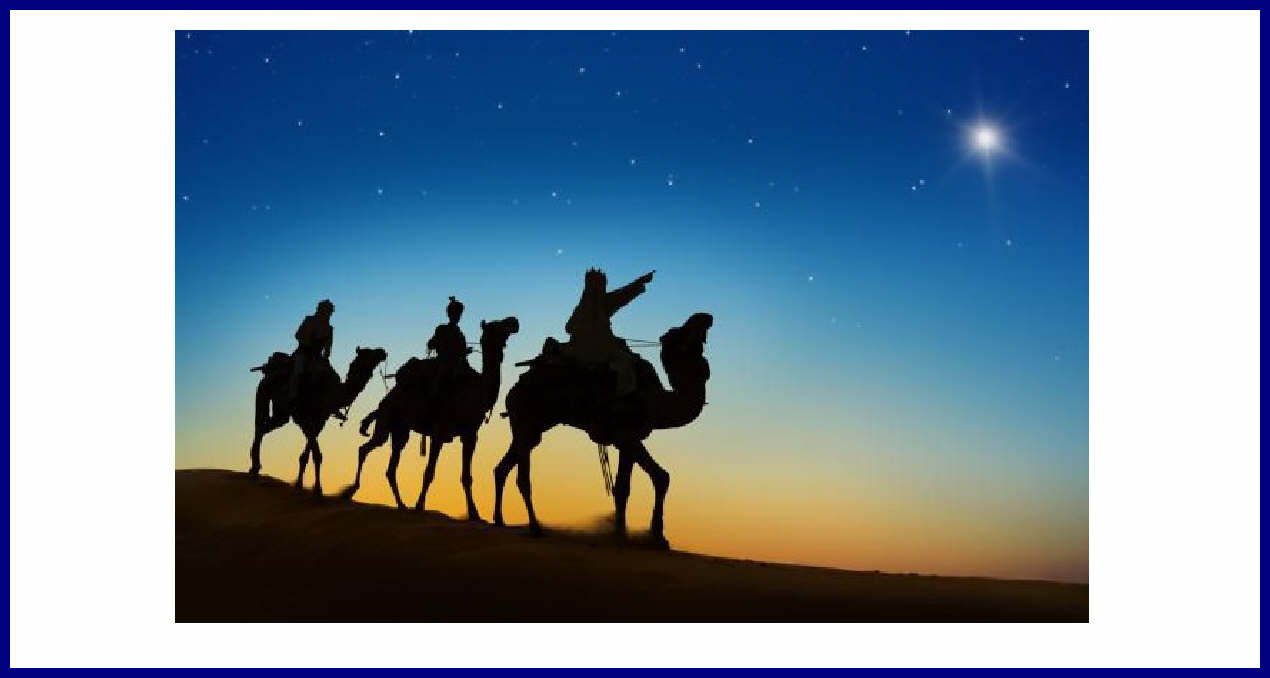
Like the Magi, follow your star!
“Go forth from your home and go to a place that I will show you.” This was the call to Abraham, but the Magi must have received a similar call They were sent to worship the king of the Jews but they did not know where. After consulting with Herod, the star they had seen in the East went again before them. “When they saw the star, they rejoiced exceedingly with joy.” The star was not just their guide but the symbol of their quest; for them it was the sign that God-Emmanuel was with them. When they found the child with Mary in their poor lodging, they fell down and worshipped him, although he had no appearance of Jewish royalty. It is only through the mysterious insights of faith that they could recognize divinity in his humanity.
Like the Magi, we must follow our star. We are not mass produced; each of us is as unique as our finger prints and our face. We are in the palm of God’s hand; he does not need face recognition. “I have engraved you on the palms of my hands; your [face] is continually before me.” (Isaiah 49:16). Each of us has a mission or a role to play in God’s Kingdom.
The meaning of life is in its mission, and meaning and mission are based on faith. We embark on a career without knowing where it will lead. We fall in love and get married without knowing the end result. Jumping into the future requires some faith in the future; and for any mission we must banish fear. “Fear not, for I am with you; be not dismayed, for I will help you, I will uphold you with my victorious right hand.” (Isaiah 41:10) To walk over a precipice on a suspended bridge requires faith. “Fear not. You are in the palm of my hand.”
The future is made through the repetition of the present. Each day we must have faith in the few talents we have. It is by investing them and making them fruitful that we create our mission. It is often only at the end of life that we can read its meaning. Follow your star. It may be cloudy at times. But like the Magi, our quest will lead us to the king of kings. “Fear not. I have engraved you on the palms of my hands.”
See the 2020 Reflections